#i know this is deeply specific but i literally take no lasting effects from horror EXCEPT in these specific cases
Explore tagged Tumblr posts
Text
In retrospect, one of the weeks I'm home alone was not the time to start House of Leaves, but yolo.
#it's VERY good but unfortunately falls in the category of the Only type of horror that can give me the chills#(realistic horror that is well situated enough that I can't rationalize it out of existence and also has an element of following the viewer)#i know this is deeply specific but i literally take no lasting effects from horror EXCEPT in these specific cases#i didn't have any issue with most of the doctor who villains that people like to reference BUT the silence STILL gives me goosebumps#it's really like. it has to be realistic and it has to be something that could be happening right this moment without me realizing#it still doesn't cause me nightmares tho so it's fine#it's really only when i think about the possibility of it that I'm like 'augh' but#ANYWAY it's fine I decided from the get go that I'm only reading it on the bus#can't be in a secret horror house with a beast behind me if the bus is hurting down the street. check mate mark.#(i cannot spell the man's surname and i will one day get it but today is not that day.)#and i won't be on the bus until Thursday so I'm gonna finish fire weather and then finish rereading gatsby. yep.
12 notes
·
View notes
Note
Lisa,
Per our last letter: I am so impressed! Physics is fascinating but I do not have the brain for it. I love when my friends who love math and physics tell me about it though, they make it make sense, you know? My last roommate kept a whiteboard in her room and just FILLED it with mathematics and would dissect math problems in conversations with us in order to solve them. It was fun. Pity about the Men In STEM type of Personality though, I'm sure you're a delight to chat with minus the golf. Funny, I get zapped myself.... not irregularly? I like the way it makes my fingertips buzz.
As for essayists and Youtubers I also quite like Jacob Geller and watch Bernadette Banner, Bernadette is an inspiration to me. I'm very familiar with both nightmind and Defunctland, I also share a theme park fascination. I love videos of urban exploration in places like that, as well as the technology behind them. My specific fascination is dark rides, but I also enjoy just watching rollercoaster videos too just cuz they're neat. I started in the theme park side of youtube when I started watching Haunted House runthrough videos, looking at the effects and costumes, then it moved on to the dark rides and went from there.
I also watch Morgan Donner, Nicole Rudolph, Karolina Zebrowska, Sew Rena and Rebecca Maksy who are in the same vein of creator as Bernadette. I also enjoy doll creators in the background like Dollightful and Hextian, etellan and Poppen Atelier. Essayists I like, or content creators in general, Athena P is deeply funny, Strange Aeons and Izzyzz are very popular, Kaz Rowe is my BELOVED for a LGBT perspective on history, Li Speaks and Dream Jelly for nostalgia essays, CZWorld and Dead Meat are great for horror, Caitlin Doughty for some really good insight on death work and death culture though she is by no means the last and only creator i follow on that, and hazelyt with their AMAZING creepypasta retrospective I cannot recommend more. If you like horror, but not necessarily campy horror, check out the yt channel nana825763. They made the famous username666 but made this absolutely insane short film called "my house walkthrough" that is a must see for those who like horror that allows you to dissect it moment to moment but isn't very long. Entirely practical effects, I cannot stress how much this formed a huge portion of my standards for scary stuff that doesn't rely on jumpscares, but pure artistry. They literally destroyed this house over time to get each take for the movie so it is WILD to imagine how they did it (the behind the scenes is also amazing).
- Creature
P.s.: I'm so glad you liked Frankenhooker! Definitely one of those sleeper hits that you can tell inspired some of LF, along with things like Re-Animator and Weird Science, Death Becomes Her too (which has some WILD old effects). But I also see the Heathers and Edward Scissorhands comparisons. Not sure if you're a Heathers fan?
i do like heathers quite a bit! and i love edward scissorhands! all the movies you mentioned there i’ve seen more than once and i like ‘em a lot! there’s a thing i’ve seen around more than once about how if lisa frankenstein the movie was actually made in the 80’s, we’d be played by johnny depp and winona ryder, which i do kinda agree with-
thank you for the recommendations too!!!! i cannot wait to check out “my house walkthrough”! it sounds so so so cool, omg. for your little description, it reminds me of, like, wham city comedy’s projects “unedited footage of a bear” and “this house has people in it”? both of which i absolutely LOVED
plus i’m a sucker for good practical effects? i love when you can watch an effect and see viscerally how real it is, because something is actually happening on set? even if it isn’t “perfect,” at least it’s real, ya know?
it’s the same principle as my fascination with theme park engineering? cause a lot of those places have to conceal the actual inner workings of things to maintain illusion, but they’re all real and practical and i think it’s so fun to try and figure out every bit of engineering that went into how the effects work? it’s like a puzzle, i guess
real, physical special effects are just so so cool
- Lisa
#ps: you’ve been chatting with me for a few weeks now so i’ll leave the judgment to you#do you think i’m a delight to chat with?#:P
0 notes
Note
(apologies, anon, i've tried to write this several times and i can't do it Not angry.) the product is the image, music, and merchandise. not the human being. what the hell do you mean it "doesn't make sense" to expect people to treat their fellow humans with a LITTLE decency and respect? to know that some behavior is not fucking okay? to understand that the 'above human' image is a fantasy you are paying to briefly indulge in?
this is literally the same kind of argument that has gotten so many celebrities killed in the past, be it directly by paparazzi or indirectly by the dark life choices it pushed them down. should we also "not be surprised" when people demand a squeaky-clean image from disney stars well into adulthood, and just Not be disgusted by how blatantly they don't care about how that pressure effects said star? NO!!! you fucking criticize that shit!! you remind them that this is not a doll for you to shape and pose, it is a PERSON. a person who is spending time and effort to give you a FANTASY. this is true of idols, bands, movie stars, tv stars, influencers, every person in the entertainment industry.
i just. i don't get it, are you actually so deeply entenched in the idol fan culture that you have forgotten that the very premise of what you're viewing is a lie? a play pretend that you are meant to play fairly by?
i do realize this is about kpop specifically and that my initial anger is unlikely to convince you of anything, but... if you really, genuinely don't get it, my sincerest advice to you is to watch something about idols and the consequences of that dehumanization. Oshi No Ko; Perfect Blue; White: Melody of Death. that last one is specifically korean(and my favorite horror movie), if you feel like japanese stuff won't 'get' it. take the time to really soak in the reasons why this is such a big deal and why it needs to be taken so seriously. people are shocked because the attitude you are describing Kills People. that is not an exaggeration, that is not a joke, and that is not a hypothetical.
I'm having difficulty understanding why kpop fans keep having the same conversations over and over again, sincerely a casual kpop fan since 2010. I can understand being upset at seeing crazy fans dehumanizing idols, but even then, it doesn't really make sense. Their job title, "idol," implies they aren't human. They're above being human. The kpop industry is extremely transparent about marketing the groups and individual idols as products and relying on stan culture for longevity. (It's still wild to me how there's a position of "visual" in every group. I couldn't imagine a group coming out in the west and basically telling everyone that someone's job is just to look good, lol.) So, they're products when they're rookies, when they debut, when they promote, but suddenly you expect people to remember they're human. And I don't think this is something that fans can really combat. It's something the idols and the companies have to iron out themselves, but being surprised that people see a product (an idol) and treat the product like a product baffles me. Like, "Yes. Of course, the crazy fan did that. That's the behavior kpop companies are courting. Why is anyone shocked that they're treating the product like a product?"
--
26 notes
·
View notes
Note
Do you have any podcast recs that are super easy for those of us with audio processing problems? For me specifically that means one voice (or maybe two if they’re very distinct) and minimal complexity in the soundscaping, though if you have recs that don’t fit those that you think might apply to other people w/ different audio processing issues you can talk about those too! :)
I can certainly try! I feel as though I should put it out there that I often have a difficult time gauging where a podcast sits re: audio processing/HOH listeners; the literal entirety of my day job is being good at telling what people are saying in audio, and my own audio processing problems mostly just result in my near-inability to keep up with actual plays, so if any of these are misjudgements on those terms I apologize in advance.
* means that I know there are also transcripts available for the podcast in question!
SAYER: scifi dark comedy/horror. In a morally questionable tech corporation’s moonbase facilities, advanced artificial intelligence SAYER directs employees about their daily routines; this then turns over time into possibly the best story about AI I’ve ever heard. Especially in the first three seasons, virtually all speaking is done by one voice. (Caveat that a few other characters come in later, and they’re actually all voiced by one guy with different filters, but the filters are pretty distinct and characters tend to identify themselves by default at the beginning of every conversation.)
*The Cryptonaturalist: comforting supernatural folksiness. The titular expert on all things strange and wonderful reads poetry, admires nature, and talks about wonderful creatures like foxes that live within library shelves, stick insects that camouflage themselves as whole trees, salamanders that swim in parking lot asphalt, and Owls.
*The Hidden Almanac: comforting supernatural weirdness. Hagiographer, avid gardener, and Mysterious Dude In Plague Doctor Getup known as Reverend Mord gives tidbits of the history of his strange and fantastical world, along with gardening advice. Sometimes his tequila-swigging accidental necromancer best friend coworker Pastor Drom shows up. Written by fantasy author Ursula Vernon and mostly voiced by her husband Kevin. Extremely relaxing to listen to; the show ended last year but they put out five-minute episodes three times a week for eight years so there’s plenty of it. The first year or so actually doesn’t appear on most podcatchers so maybe check out the website.
Everything Is Alive: poignant, heartfelt interviews with inanimate objects. While there’s a different object featured each episode, it’s mostly just them and the interviewer, plus occasional phone calls with an expert on some subject brought up during the interview. Hits so much harder than you could possibly imagine given the summary. You WILL be upset about a can of off-brand cola.
*Quid Pro Euro: bizarre comedy mockumentary. A satire of the European Union in the style of a set of instructional tapes for EU employees made in the ‘90s, predicting what the EU would look like in the 21st century. Their predictions are somewhat off. Only one voice and delightfully it is Felix Trench. I don’t know anything about the EU but I still think it’s hilarious.
*Glasgow Ghost Stories: spooky supernatural. A resident of Glasgow is unexpectedly able to see the many ghosts that reside in the city -- but the ghosts have started to notice her too, and not all of them are friendly. A beautiful and atmospheric single-voice show; plus the feed also contains the very good miniseries Tracks.
*Palimpsest: poetic and haunting. An anthology series about young women experiencing supernatural happenings, each 10-episode season tells a different story in monologue (I think there are literally two episodes with other voices in them). Poignant, gorgeous, and sometimes heartbreakingly sad in the best way. In season one Anneliese wonders about the strange neighbors at her new apartment. In season two, Ellen takes a new job as companion to a supposed fairy princess imprisoned in a strange showroom in turn of the century America. In season three, former codebreaker Josie begins to see the spirits of the dead on the streets of London during the Blitz.
*Within the Wires: alternate history scifi found footage. From a world where a calamitous global war resulted in the installation of a new Society where nations and family ties are banned, an anthology of voices telling their stories. Each season is a single voice. Season one, a set of relaxation tapes deliver unexpected instructions to a government prisoner in a strange medical facility. In sSeason two, a series of museum exhibit guides spin out the mystery of two artists and their work. In season three, a government employee dictates notes to his secretary and begins to suspect a plot. In season four, the traveling leader of a secretive cultlike commune leaves sermons for her followers, and instructions for her daughter.
*Alice Isn’t Dead: lesbian americana roadtrip weird horror. Keisha’s wife Alice was missing, presumed dead. Now Keisha is a trucker, traveling the vast American emptiness to seek her out; but she’s about to become embroiled in the same vast secret war that may have drawn away her wife, and she’s not alone on the roads. Starts with one voice, adds a new one each season for a total of three. Also is finished.
*Station Blue: psychological horror. Matthew takes a job as the lone caretaker of an Antarctic research station for several months. This goes about as well as you’d predict. Very much a slow burn, strange, brooding horror of isolation. Heavy themes of mental illness based on the creator’s experiences of bipolar disorder.
*Mabel: dark, poetic faerietale horror. Live-in caretaker Anna attempts to contact the absent granddaughter of her elderly employer, the lone resident of a strange and ancient house in Ireland. A love story, a haunted house story, a fairy tale with teeth. This one might be hit or miss; it sometimes tends to the abstract a bit, and there’s more soundscaping and some other occasional voices besides the main two protagonists. Definitely worth trying out, though, this is absolutely an underappreciated gem.
*Janus Descending: tragic scifi horror. Two researchers, Peter and Chell, travel alone to a distant planet to survey the ruins of its extinct civilization. Unfortunately, they discover exactly how that civilization died out. Excellent if you like movies like Alien, and also being extremely sad. Only two voices. Really unique story structure: it’s told via the two protagonists’ logs of the events, but you hear Chell’s logs in order, and Peter’s logs in reverse, with their perspectives alternating. The result is a tragedy where technically you know the ending from the start, but it’s told so cleverly that just what happened and how remains a tantalizing, tense, heartbreaking mystery right until the end.
*I Am In Eskew: poetic, surreal horror. Only two voices and few sound effects. David is a man trapped in the twisting, malevolent city of Eskew, where the rain always falls, streets seem to lead the same way twice, and nothing can be trusted. Riyo is an investigator, making her way through rumors and questions in search of a man long missing and a place that seems not to exist. Maybe my favorite horror media ever? Deeply disturbing and yet even the most awful things are somehow beautiful. Like if Lynch, Escher and Mieville had a terrible, wonderful baby.
*Tides: contemplative hard scifi. When biologist Dr. Eurus is wrecked alone on a distant alien world shaped by deadly tidal forces, her struggle to survive also becomes a meditative exploration of the ecosystem around her, and a recognition that here, she is the alien. Mostly it’s Dr. Eurus; sometimes you hear from her coworkers. It’s got Julia Schifini, what’s not to love?
*Midnight Radio: ghost story/romance. A 1950s radio host who broadcasts a late-night show to her small hometown begins to receive letters from a listener and respond to them on air. I wrote this! It has a total of three voice actors and virtually no soundscaping. I promise it’s good.
405 notes
·
View notes
Note
I LOVE YOUR PORN AU!!!!! LIKE SO MUCH - and i'm just. if you don't mind me asking, how - the way you flesh out the characters, their motivations, and feelings in every scene in such an eloquent way, and just little things here and there, a habit or an activity that adds dimension to who they are, and - your prose is wonderful. you achieve this addictive, engrossing narrative space that readers just absolutely melt into, and i have to ask - how did you develop your writing style? 1/2
what books did you read that formatively shaped the way you write? or you know, what did you do to improve your writing? i'm so in awe of how you world-built and established the porn au - like lqg & hc being national taolu champions?? how do you come up with that stuff? i cannot comprehend the amount of research and effort that must've gone into porn au, and i'm just so deeply thankful that you decided to share that with us. i apologize if i'm coming on too strong, but wow. thank you 2/2
--
oh my god please don't apologize, when i saw your ask i rolled on the floor giggling hysterically for a solid 15 min, bless your heart
part of the answer to your question—i've taken like, 8 years' worth of creative writing classes/workshops! there was also a transnational literary component to my degree so whenever possible, i took literature classes fksjdfksd so whatever you see and like is definitely the result of a lot of work. My writing from not even 10 years ago but like, 5? horrid, ridiculous, wild, cringe. The Porn AU itself is the second draft of a MUCH more lackluster piece.
about my writing style. gosh, you really know how to make a writer blush. "I like your writing style" is literally an instant kill LMFAO okay okay, the useful answer: my primary criteria for choosing what to write is, don't be obvious, be interesting. Fiction tells us to show, not tell, right? Poetry is about concretizing the abstract. Screenwriting says cut all useless lines. A lot of writing rules and advice—never start with the weather, avoid detailed descriptions of the characters, don't use adverbs, etc.—are all really about this exact sentiment.
I once took a seminar on writing for horror movies. The golden rule of the horror genre is Never Show the Monster, because whatever the audience is imagining is always going to be scarier than what you actually show them. There are obviously exceptions to this (to all writing rules), but in my mind, it's all the same principle.
LONG answer under the cut
So you start with building a scene. I approach it like essay-writing—I state my thesis for the motivations/main propulsion of the plot. "In this scene, LQG and SY are motivated to save Cang Qiong's porn production, so they have sex on camera." Then you build the sub-motivations: "LQG is also doing this because he's pining after SY."
I learned this "thesis-writing" from theater, specifically from writing 10-min plays. Theater is all about characters being driven by their wants and needs, and the reason I say 10-min plays in particular is because longer forms of writing will give you more leeway, but in 10-min, you pretty much need your character motivations established from their very first line. That's why you need that very clear thesis for yourself—if you don't even know what the character wants from the get-go, then you can't establish who they are, what they want, and where they're going to go in a dynamic and interesting way.
So this thesis drives EVERYTHING that happens in your scene, just like an actual thesis for an essay, just like topic sentences for your paragraphs. Once I do this, I have the emotional direction & narrative scope of how much this scene will cover, I have a sense of where it begins and ends. "Begin with the dynamics of their sex. LQG starts showing signs of his feelings. Reveal LQG backstory for exactly what those feelings are and why he isn't telling SY. The rest of the scene implies that LQG's feelings may not be so unrequited, but also sets up the fundamental problem at the heart of the whole fic—SY's inability to comprehend his own feelings." This is kind of my new thesis now. They're having sex; LQG pines; SY doesn't know he himself is pining.
Now it's time to manifest. This is the "storytelling" part, and the hardest lmfao.
Personally, my approach is largely shaped by my very cool screenwriting teacher, who hammered into us: don't fucking waste lines. The Golden Rule of screenwriting is that every line should reveal something new. I found my old writing kind of repetitive, especially on the emotional front, so this is kind of my editing mantra now—is this line either propelling the story or revealing character? If it's revealing character, is it a revelation that has to happen right now, or is it slowing the momentum of the scene?
But these aren't rhetorical questions! "Momentum" doesn't just mean tumble forward as fast as you can, it also means taking the time to draw the bowstring back further, so your next move has even more propulsion. That's why you get the little "LQG has been in love with SY..." cut scene in the middle of the fucking (at least, that's my reasoning for putting it there). Every line has to bring a fresh revelation that "proves" your thesis further.
That brings me to the details. You said you like the details I inject into the world-building, and honestly that's so gratifying to hear, because that means I'm successfully manifesting my intentions, y'know? "Every line has to bring new info" kind of sounds like a tall order, but the most effective way I've seen it done in books and onstage/onscreen is with these hyper-specific details. If you're writing a scene in which someone feels dirty, never have them just say that—have them say they want to take a shower. Show them running out of bleach again as they scrub down the stall after they wash. Begin the scene like "Steve always washes his throat first now." Then pack the scene with even more revelatory details: "Soap in hand, he heard the pipes above his head groan for a half note on adagio, and readied himself for the blast of icy water that always followed." Shitty shower, probably not rich, is likely a classical musician.
By the same token, I want to build LQG's character. The "Liu Qingge has been in love with Shen Yuan" section is the first insight we get into his background and perspective, right, so: I need to establish LQG's emotional context for filming this scene -> I can characterize him as a nut for martial arts in the same stroke -> so this takes place at a gym, beating up sandbags is a classic way of showing manly emotional distress -> so give me more details on this gym -> Puqi Gym, XL the martial god is obviously the owner -> how do I have XL & LQG a relationship beyond gym owner & client? They spar together -> I want XL & HC's position in this AU to mirror their god/ghost king statuses in TGCF canon -> how can I concretize their fighting prowesses in real-world details? -> they're martial arts champions -> what's an actual competitive martial art form that involves weaponry? -> wushu -> wikipedia Wushu, find taolu weapons sparring
(I just realized that in my songxiao daycare AU, Hualian are Olympic gold medalists by the same narrative logic laksjdnflaksjdnflsd)
So, that's the flow of logic behind my world-building lmao. It's all in the details. Leverage is one of my all-time favorite TV shows and the way they build their stories is super inspiring. If their thesis is "the rich and powerful take what they want, we steal it back for you," they manifest it in the most specific and concrete narratives: mine workers who like the work but are fighting for workplace safety vs. the money-grubbing mine owner who will blow up their livelihoods if it means a bigger payday; the little girl from Iraq with refugee status forced to be an accomplice to antique smuggling vs. international smuggler with a fetish for British royalty.
Last pieces of writing advice I've gotten: pay attention to the real world. A writing exercise we did was just sit in a public spot and make concrete observations on our surroundings. There are stories in everything!!! I learned to observe things like weird holes in the concrete (earthquake? drilling accident? bullet mark?), odd patches of moss or bird shit (look overheard: it's an AC unit dripping water for the former and nesting swallows for the latter), ladies in flipflops walking alongside ladies in high heels (excited mother walking her antsy daughter to the bus for the daughter's first job interview—the daughter's shirt collar is unfashionable and she's taking the bus, so there's a good chance the shoes were passed down, maybe from an office lady aunt. Maybe she's even overdressed for the interview, so will her outfit be an unintended source of tension once she gets to the interview? Is it a group interview, to make the comparison more stark?).
Also, write what you know. You know why SY is a video editor in porn AU? Because I'm a video editor. One of my more popular MDZS fics is set in a plant shop 'cause I worked in a plant shop. SL was First AD in Bachelor!AU 'cause I was First AD on a set once. Concrete details like the editing software having a split-screen, always answering questions about how often to water plants, and being up until 3AM editing call-sheets are the ones that will fully immerse your readers.
And if you can't do the actual things, just watch someone who is, listen to them talk, pick up lingo, and fake it. I watched like a 15-min vox video on fencing for the fencing!AU and a 45-min music theory video on the hospital pianist!AU (also I started learning piano sklfjnlsdjlfkjsd). Of course, I just finished reading a wangxian fic that had me going, "holy fucking shit, the author is literally getting their masters in a music program" so my 45-min youtube video ain't shit, but if you just need a little bit of character establishment, then it's enough to do the trick.
Anyways, tl;dr. Find the details, find the tension. Never tell outright what the tension is supposed to be, manifest it instead. Make the manifestation as interesting as possible, and if it's meant to be funny, make it funnier.
Sorry this turned into a fucking lecture lskjnflskdjnflskd but last thing, someone asked me before if I had formative authors, and this was the list I wrote at the time:
Angels in America (play) by Tony Kushner
The God of Small Things (novel) by Arundhati Roy
The Penelopiad (novel) by Margaret Atwood
“Litany in Which Certain Things are Crossed Out” (poem) by Richard Siken
Night Sky with Exit Wounds (poetry) by Ocean Vuong
Giovanni’s Room (novel) by James Baldwin (and then Go Tell it on the Mountain and then his essays)
Franny and Zooey by J.D. Salinger
And, ooh, now that I have this list I think I can even roughly sort it as such: Kushner, Atwood, Siken, and Salinger I really latched onto for their dialogue and very present narrator voice—same is true for Go Tell it on the Mountain. Roy, Vuong, and Giovanni’s Room, I think, are texts more representative of the kind of saturated figurative language I like, and emulate. Of course they all do imagery and voice and overall structure amazingly, but that’s the rough dividing line I’d draw.
But yeah James Baldwin is my fucking hero.
#long post#about me#writing#jesus sorry i spent way too long on this laksjdnflaskjdnflaskjndflas#but anyways i'm super grateful you gave me the chance to introspect and articulate all this#i'm exceedingly grateful too to all the writing mentors i've gotten to have#personal#these are the principles and rules i've learned and#i still definitely screw the pooch#on them#so you know this is just what's on my mind#this is how i school myself
11 notes
·
View notes
Text
Octodad: Not-so-dark theory
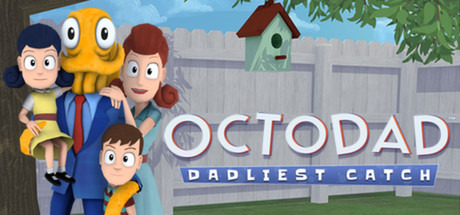
From top to bottom, Octodad looks like a fairly innocent game, A simple story about an Octopus trying to survive in suburbia. But, through subtle hints and references, and inconsistencies with that premise, it is revealed that Octodad is no mere cephalopod. He is, in fact, something far more horrifying, on paper at least... What do I mean?
Octodad is not, in truth, an Octopus, He's a Cthulhi. For those not familiar with the works of H.P. Lovecraft, Cthulhi are also called "The Starspawn of Cthulhu" and "Xothians," and are a race that looks like Cthulhu who's true origins, as with everything in the Cthulhu mythos, are debatable and vague as sin, the only things known for a fact are that they look like Cthulhu (Or, in their first appearance, like Octopi), worship him, followed him from their home dimension/universe into ours, and then perished en masse while what remained of them went into a death-like sleep, same as Cthulhu.
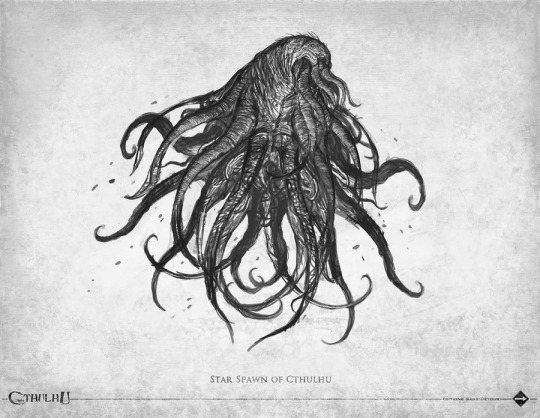
Now, Star Spawn aren't often seen in the works of Lovecraft, but they do have a sliver of popularity in the fandom. Not as big (in the popularity sense) as Deep Ones, but not as unknown as the humble Penguins of Leng. Now, again, it's worth noting that common interpretations of Star Spawn are basically baby Cthulhus, just tiny versions of their dark and malevolent master, but to start with, they were described as "a land race of beings shaped like octopi and probably corresponding to the fabulous pre-human spawn of Cthulhu," in the story "At the Mountains of Madness."
Octodad highly RESEMBLES an octopus, but with some interesting tweaks. Namely: His eyes, two of his Tentacles, and something we'll talk about in just a minute. But let's talk about Octodad's anatomy when compared to another octopus, namely, the one in the "Wold of kelp" at the Aquarium.

Now, this is Octopus is a giant, climbable sculpture one might see at a water park, so in a technical sense, some liberties could have been taken with its anatomy, but it looks semi-accurate to real octopi, down to the slit-like pupils and the tentacles all being at roughly the same spot despite them spreading out for kids to climb on. Now, if you pay attention, a patron of the Aquarium will note that the "World of kelp" was something else before it was the world of kelp, though they THINK it was "Squids or something" before. Based on how the section played out, I have to believe the whole affair was either cephalopods in general given how many bases of just kelp they went over, or just Octopi because HOLY CRAP there are lots of octopi out there. Failing that, I don't think the statue was a squid to begin with, the eyes are far too forward on the head, what can be seen of the tentacles makes them all look the same, and most species of squid have circular pupils and irises, not slits/rectangles.
Octodad, in contrast to the sculpture, has vertically ovular pupils, far rounder than the slits on the larger statue, on top of that, his eyes take up a slightly larger portion of his head. Then we take a look at Octodad's tentacles, namely the two that form his mustache. These two tentacles are set away from the other six in a way that makes no real anatomical sense for an octopus. Not to mention that the two are preposterously shorter than the others, it's less like another pair of tendrils and more like a strange growth coming out of the middle of his head. Moving on from that, there's also a certain disparity with his other limbs, his "arms" are shorter than his "legs" when he stands, however, when he enters water, his limbs, save for his mustache, are all of equal length, this strange effect carries over to when he's buck-ass naked, so no, he isn't just scrunching two up while he's in the suit... Speaking of naked octodad:
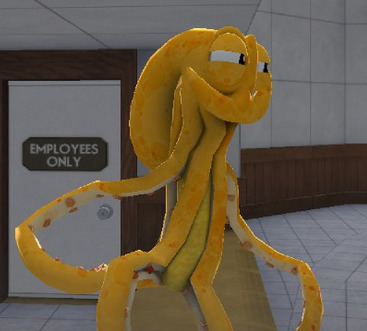
What the hell is that THING in the midst of his tentacles? It's a lighter color than the others, he's still using two tentacles per leg, one per arm, and his mustache is basically vestigial. Octodad's anatomy makes no fucking sense unless you consider the idea that he has some level of shapeshifting power... and wouldn't you know it, Cthulhi have just that. To what end is a little shakey, as with most things in the Lovecraft universe, but still.
Also worth noting is the church Octodad got married at, a Church dedicated, at least partly, to Cthulhu himself. Now, we only see one window with any kind of figure on it, Cthulhu, wereas the others are all decked out with a strange symbol, as are a few paintings lining the walls of it. These paintings may be of religious significance to the practitioners of this particular faith, but a lot of it looks like some minimalist "If you get it you get it" kind of stuff, and then one is literally a crayon drawing of a child with a smiling balloon. The last vaguely Lovecraftian thing in the church is the treasure chest Octodad gets his wife's ring from, all the coins within have a squid/cuttlefish-like creature printed on them, In the story "Shadow over Innsmouth," the people of a town called "Innsmouth" start breeding with fish people. They did it specifically for the undersea gold the fish people (called Deep Ones) give out for the service. Deep Ones worship multiple gods, cheif among them are their great parents, Mother Hydra and Father Dagon, though worship of Cthulhu isn't against their laws or anything.

The game takes a break from the hints of Eldrich horror while the family is at home, though it is worth noting that we don't REALLY know where Octodad's children came from. Hell, the game makes a joke about it at the end, Tommy asks, plain as day, "If dad's an octopus... Then where did me and Stacy come from?" While his parents laugh the question off, it has a few possible answers: The two of them (Or just Tommy) are leftover from a failed relationship/marriage Scarlet was a part of before Octodad came in, the two (Or just Tommy) are adopted, or, in a manner not dissimilar to deep ones, Cthulhi may just be able to breed with humans in this universe.

Now, I say Tommy may be adopted/Not Octodad's specifically because Stacy says something concerning in the "Deep sea" exhibit at the Aquarium. She apparently has dreams wherein a deep, dark spot in the ocean seems to call to her. This turns out to be a sea horse ranch. Cute as that is, dreams are a recurrent theme in Lovecraft's work, sometimes compelling people into the service of Great old ones like Gla'aki, for example. Or there was that one story when a guy met Yog-Sothoth, the omniscient and omnipresent god of the universe just because he dreamed that deeply. Also "The Dreamlands" are a place in Lovecraft's fiction. I could keep going down that rabbit hole, but I'm lazy and I think that point is made.
There is also another reference (Possibly) to "Shadow over Innsmouth" and "Dagon" with the character of Chef Fujimoto. Now, Fujimoto himself is not a reference to anything in particular, but his backstory has some Lovecrafty bits. Namely, Fujimoto was once a soldier (Dagon) who cut open a combatant. Instead of human guts, "Piles of fish" were inside. (Shadow over Innsmouth.) This one might be a little more of a stretch but remember that Fujimoto is OBSESSED with Octodad and believes very firmly that there are fish people everywhere. ("Why is everyone fish!?") There are several Lovecraftian stories where the character feels he is being pursued or is surrounded in some way. Call of Cthulhu ends with one of the characters feeling that the cult is gunning for him, partly because some dude looked at him funny, and Dagon ended with the main character fearing that a servent of Dagon was coming up his stairs after him, so he threw himself out a window. The crippling paranoia experienced by Fujimoto is another hint that SOMETHING Eldrich is happening in the universe of Octodad.
Also worth noting is that a magazine entitled "Inquisitor" can be found at Gervason's, Octodad is on the cover, and they think he's an alien. Which begs the question: Why is it that most humans will let an obviously strange man do things without much concern at all? Hell, there are three lines present in both the main game and one of the extra shorts that imply EVERYONE sees something is wrong with Octodad. And I quote/paraphrase:
"I thought he was a lawyer?" "He's slimy enough to be one."
"Is it just me or did the captain look jigglier than usual?"
"Hmmm, I don't see a blurblerulb on the list."
These lines imply on some level that people recognize SOMETHING is wrong or different with Octodad but they don't carry the thought far enough to do anything with it... Unless perhaps at a distance, hence that cover of “Inquisitor.”
Another thing that tends to happen in Lovecraftian horror is the mind not making proper sense of things. For example: Canonically in the mythos, the image of Cthulhu mankind sees, humanoid body, octopus head, draconic wings, etc, is not what he really looks like, it's just our perception of Cthulhu because our minds aren't equipped to comprehend the real deal. Looking too long at just what we can see of Cthulhu will unravel your mind, causing both insanity and death if exposed even longer. I think that's part of Octodad's effect. When he's dressed, the humans around him perceive what their mind makes sense of. He's in a shirt and pants, therefore he is appropriately dressed as a human, therefore their minds SEE a human even if he's not QUITE right. We see, rather obviously, that he doesn't have human hands, he has tentacles with suckers, but Scarlet refers to it as a "Hand" still, this implies she and others see his appendages as hands or feet when he's disguised or doing something "Human enough." Only really undone if he's naked or does too many strange or seemingly malicious things like accidentally smack someone with a bag of doughnuts.
This is why you can get away with randomly dragging things across the floor, their minds are telling them something is a little off, but their ability to perceive might be telling them he's just got a medical condition or something. It's nothing to judge him for, he's just got a disability.
So at the end of that trail, what are we left with? Octodad as a Xothian/Deep one hybrid? Does that fundamentally change the game's story? Does this mean Octodad is a dark horror from beyond? Does he secretly seek to kill and maim and destroy all the things we hold dear? Will he one day help awaken Cthulhu and usher in the new age of the great old ones? No. See, Octodad, despite his horrifying inspirations, is a benevolent creature. He "blubs with a love for all mankind" in the ending for Dadliest Catch. He still obviously loves and cares for his family, whether they know his secret or not. He's just an alien from another dimension... or at least he has ancestry from another dimension.
Now, why is that? I've got two little ideas for that: It's an often found interpretation that most of the original writings of Lovecraft focus on the idea that "It is different, therefore it is bad." Xenophobia of an extremely high sort. Mind you, I often find this interpretation lacking, but we can probably discuss that later. I feel Octodad may be a natural extrapolation of the idea that it isn't bad because it's different, in fact, Octodad, despite keeping a secret, is an all-around "good" guy. Upstanding, moral, all that garbage, he just happens to be non-human. Something supporting this being a running theme is the scene with the Snugglefish. For those who have yet to play Dadliest catch, a section of the game takes place when the power in part of the Aquarium goes partially out. During this event, Octodad and Stacy come upon a large sculpture of a creature called a “Snugglefish.” which is covered by the dark. We shine lights at the supposedly malevolent creature, complete with monstrous teeth and evil red eyes, partially with the intent to “Blind it” despite the fact that its obviously a statue. That whole section up to then is nothing but fumbling in the dark, looking at the strange and some might say “alien” life living in the deep ocean, you can also learn some stuff about them if you pay attention. The whole thing ends when you fully light up the spots on the statue, revealing it to BE a Snuggle fish as opposed to some giant monster. As a result of revealing this, Stacy’s fears of it go right out and she feels she understands the creature better, as with most things, learning and understanding quiet one’s fears. when we learn what something is, we stop seeing it as an immediate threat is the take away from that section, I think, which is, again, I’d say, a call to Lovecraft's writings and his fear of that which was different and unknown and how it’s so easily thrown out with just a LITTLE understanding.
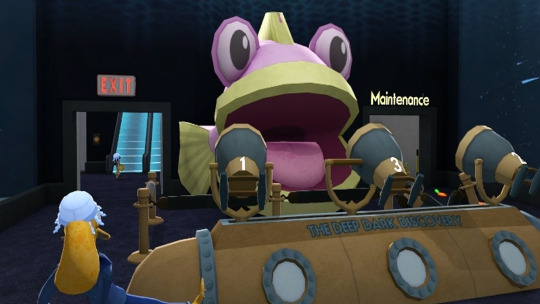
Another plausible explanation for Octodad’s kindness may be that Octodad is not a Star Spawn of Cthulhu, but of Kthanid. Kthanid is not an original creation of H.P. Lovecraft, but a bloke by the name of "Brian Lumley." Lumley's creation is the brother of Cthulhu, and is considered the main reason Cthulhu is sealed away these days. Kthanid is said to look almost exactly like Cthulhu but to have "Golden eyes that radiate peace." He's a loving, benevolent "Elder God" that wants the best for not just Humanity, but for all things. It would logically follow that if a creature dedicated itself to Kthanid, or was one of his spawn, it would be at least mostly as loving and kind. So, if Octodad, or "blurblerulb" if you prefer, was a purely hypothetical Kthani instead of Cthulhi, his disposition may well fit within the actual mythos.

So, what do y'all think? Does this theory hold water? Or does it sink harder than Cthulhu going back down for a nap?
#Octodad#Dadliest Catch#Tommy#Stacy#Scarlet#Chef Fujimoto#Cthulhu#Lovecraft#Kthanid#Xothians#star spawn#cthulhi#Deep Ones
119 notes
·
View notes
Text
The Blunt Reality of Attack on Titan
August 4, 2020
Written by Samantha, Slutty Opinions
OPENING
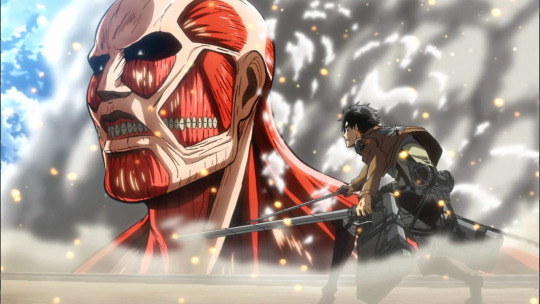
People usually tend to associate anime and manga with being crazy over the top action packed experiences. Attack on Titan is a series full of exactly that. It’s a hugely popular franchise known for having insanely cool action and bombastic music. People flying around doing impossible feats and fighting fantastical enemies that are larger than life are common. Despite all this flash and excitement, the series never lets you forget the harsh reality of the world itself in a unique way, effectively separating it from many of its peers.
This grim reality is basically used to beat the audience over the head over and over, at times too liberally and too often as some would argue. I personally think how the original author of the manga that started it all, Hajime Isayama, entwines every aspect of his story with cynicism and grimness is one of the major reasons why I love the series, and I’m willing to bet it’s a big reason for a lot of fans whether they know it or not. Before I get into the details, I will say that I won’t be putting in any real spoilers of either the manga or the anime so if you’re just curious about what I may have to say, you can keep going. I’d also like to mention that I am more of a recent fan, but still a big one. I’ve seen the entire anime and have been trying to catch up on the source material, so my knowledge and opinions will be limited to that amount of content.
THE TITANS
For anyone unaware of the basic premise of Attack on Titan, the last remnant of the human race has been trapped by huge humanoid beasts in an expansive settlement surrounded by walls. It is humanity’s job to fight off these mindless monsters and survive behind the walls. The titans are a large part of what creates the identity of the series. Seems kind of obvious since it’s literally the title and all. The way these titans are integrated into the action and the story of the show is a large part of what prevents Attack on Titan from simply being another generic action series that ends up forgotten as a flavor of the month. It seems like I’m not giving the series enough credit because there is a LOT it does right otherwise such as pacing, story structure, characters, and so on that combine to make an incredible experience that has captivated many. However, I still stand by the idea that the titans help make the franchise feel truly one of a kind.
Everyone who’s ever seen the titans has probably noticed how grotesquely and uncannily they are designed. In the manga, the whole world and the way many things and people are drawn especially all have very creepy vibes to it all. While it would be a huge stretch to claim Attack on Titan is a horror manga, it’s common sense to acknowledge it’s strongly influenced by horror. The absolute sense of uncertainty and powerlessness these monsters present nearly every time they’re on screen is overpowering to both the characters that must deal with them and the audience as well.
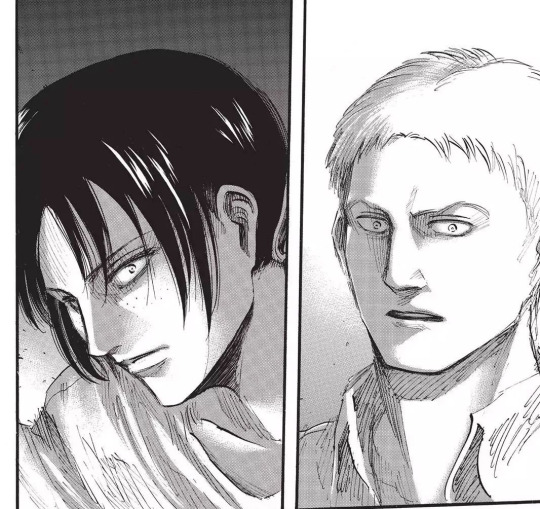
Isayama creates a feeling of dread involving these beasts insanely effectively. Any encounter with them even if it is merely 1 or 2 of them can always lead to sudden death. There is never safety in the presence of the titans even for the most skilled. Their pure size and physical ability is nearly never downplayed. While the humans have their own special weapons and crazy abilities, the titans are hardly ever presented as mere battle fodder or mulch. Titans happen to be very good at killing people and the delivery of it all makes it feel believable. Keeping the antagonists intimidating and serious is very important for the overall feeling of Attack on Titan.
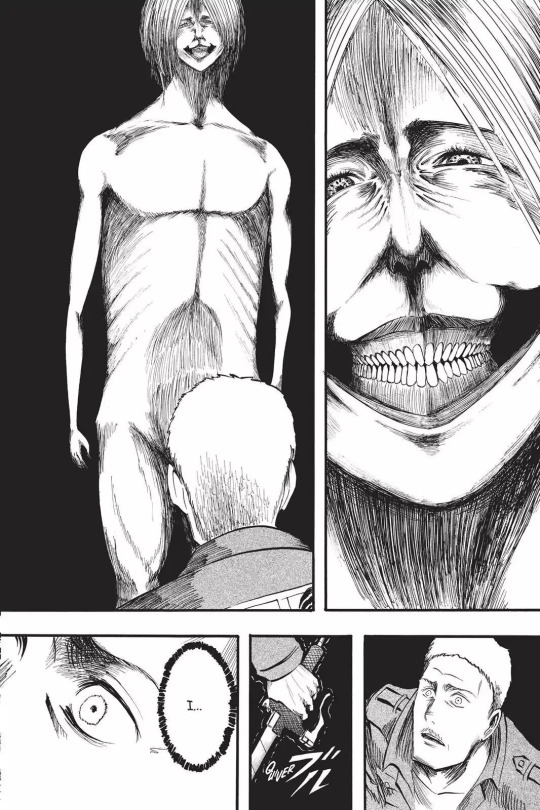
At times it can even feel like too much. The idea of any character dropping dead at any time can be very discouraging when you’re trying to get invested in a cast or just getting started. Sure that amount of pure “edge” in itself is appealing to a lot of people, but edge without purpose or substance makes for very bad entertainment in my eyes. It’s honestly in fact one of my pet peeves. I did not expect to like Attack on Titan for a long time due to this reputation it had for being brutal and random. Just not my style. When I actually gave it a shot however, I realized the writing is a lot more purposeful and I’d even say forgiving than I expected. While at times being an emotionally exhausting experience and definitely pessimistic in many ways, this series treats the terrible events that occur left and right with proper gravity and maturity.
THE NATURE OF WAR
Attack on Titan has a lot to say about a variety of subjects. It’s honestly much more subtle and intelligent than I even thought with my initial blind viewing of the anime. Reading the manga through the same events really gave me an appreciation for the thought and detail that goes into Isayama’s writing. The most obvious subject he focuses on is something that is probably less than subtle however and can be spotted quickly by anyone who has seen or read even a bit of the series.
That subject happens to be the horrors of war. On the surface the story seems to be just a simple story of man vs beast and it wouldn’t make much sense for it to have anything to say about war. While the circumstances involved are very fantasy-themed and at times ridiculous, it still at its heart is a narrative about war and how humans cope with it, both those on the front lines and those who watch from afar.
The grim and serious nature of the series is the way it is directly thanks to that theme. If life wasn’t always at risk, if it wasn’t treated as fragile, if death wasn’t respected and dwelled on and treated with the utmost permanence and seriousness, this theme would not work the way it does. Anything less runs the risk of just looking like glorification while merely saying the opposite. Admittedly there’s a lot of people who still somehow think Attack on Titan glorifies war but that’s a whole other subject. A very impactful and relevant part of the story is one early on where humanity wins a huge battle, yet no one bothers to celebrate merely because the overwhelming weight of the dead hangs heavier than any related relief ever could. This kind of grim and depressing, yet honest storytelling about war is very common throughout the plot.
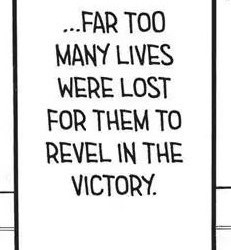
What it means to be a soldier, the intricate overlap of society, media, government, and economics on war, the will and the reason to fight, the sanctity of human life and the nature of sacrifice and finding meaning in meaningless and constant death are all discussed often and in detail in Attack on Titan and the grim realness of everything that happens in the story and the overall feeling of being unsafe it conveys are deeply important to allowing these themes and discussions to work as well as they do.
PHILOSOPHY AND PSYCHOLOGY
The last major aspect of the story that I think benefits greatly from the unrestrained reality and brutality of the series is the very unique philosophy and psychology that Isayama presents. Most of the points and lessons the characters learn through the story are not pleasant ones. Everything the characters go through and the utter bleakness of Attack on Titan’s world shapes everyone’s worldviews. People take small steps and make concessions to have hope in this world. Optimism is present plenty, but the way the characters experience optimism is still rife with sacrifice and harsh undeniable truths.
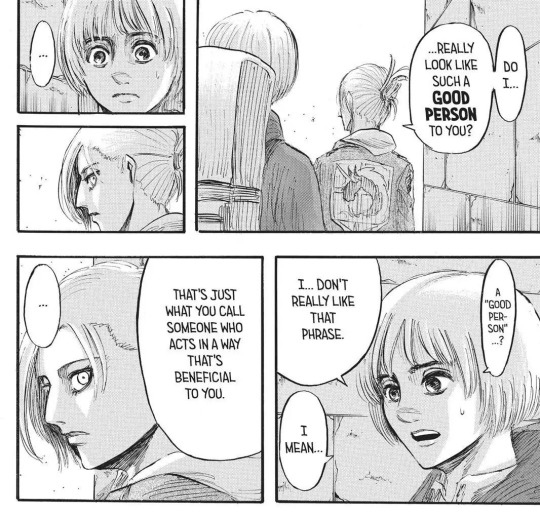
This very unique perspective compared to a lot of similar media is refreshing in its own way and kept me questioning what I knew. You couldn’t often easily predict the conclusions characters would come to because they are not what you may have come to expect from other media. One major character, Erwin Smith, is a great example of the kind of ideas Attack on Titan will throw around. His character is labeled as a demon by some, but a hero by the same people as well. The necessity of pain and sacrifice underlies all progress and achievement and he knows it and so do many others, even if it’s hard to accept. Having to create guidelines bound by the rules and expectations of reality only makes them that much more applicable to real life and real war.
Despite all this, the series never feels outright preachy. Characters dwelling on the meaning of what’s happening to them is specific to which character and which circumstances. It doesn’t feel nearly like the author is writing an essay about the way things are or should be while using characters as mouthpieces and more just people in a hard situation trying to make meaning out of the meaningless suffering around them. Agreeing or disagreeing with any point as a reader or viewer isn’t portrayed as wrong in any case it’s more a vehicle for thought as well as phenomenal character building. Like real war, none of the questions presented have a genuine correct answer. The character Levi himself at some point in the story even admits that as a veteran in battle, he can never be truly sure of his choices.
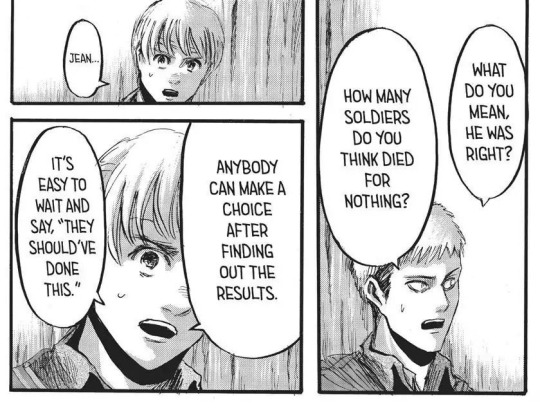
CLOSING THOUGHTS
The amount of respect and purpose Attack on Titan treats its frequent suffering with is key to the experience as a whole. While a series with just good writing all around and good reasons for its fame, something that in my opinion makes it feel like something special and something that captivated me is the overall gravity of the story. Without being effective at intensity and discomfort as well as in dealing with said discomfort, the story just wouldn’t feel real. And if it doesn’t feel real, it won’t feel like it matters. This series matters quite a lot to myself and many others and I hope this is at least a glimpse as to why.
18 notes
·
View notes
Text
BLOGTOBER 10/8/2020: PELICAN BLOOD (2019)
If you are reading this and the present date is between October 8 and 11 of 2020, please consider buying a virtual ticket to see Katrin Gebbe’s PELICAN BLOOD, available on demand through the Nightstream festival:
https://watch.eventive.org/nightstream/play/5f6e7e78d6a9bf0036613fa3
I am about to discuss this movie and its conclusion in great detail, but it would be much better for a person to come to it in innocence--not because it’s so reliant on anything as gauche as surprise, but because it is so thoroughly excellent that wading through a movie review first would be like letting your dinner grow cold. And, it simply deserves our support.
When I saw PELICAN BLOOD last year at Fantastic Fest, it became one of my favorite movies before it was even over. I might admit that this was sort of a match made in heaven, as this movie checks almost every one of my personal boxes, but I don’t think my assessment of its value is a simple matter of personal prejudice. I’ve been haunted by it all these months, and deeply worried that somehow I might never see it again. When I discovered that it had landed on Nightstream, I was over the moon.
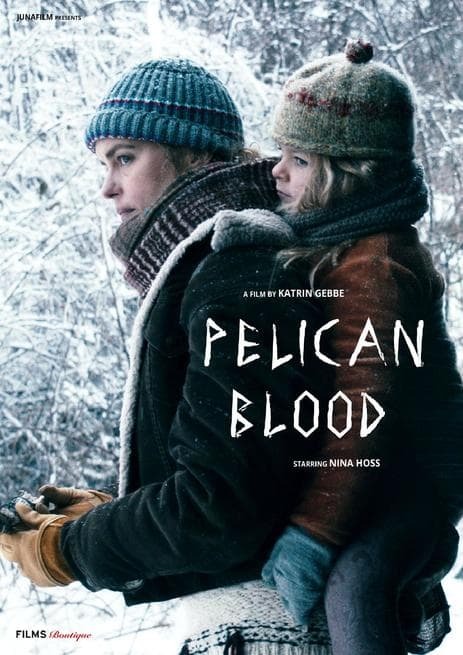
This is writer-director Katrin Gebbe's second feature, a fact that will astonish you when you see it. Last Blogtober, I wrote about her first feature TORE TANZT, which has the troubling english title NOTHING BAD CAN HAPPEN. That intense indie drama concerns a born-again christian punk who wishes for an opportunity to prove his devotion to god, and finds it in the form of a family that invites him in off the streets, and then proceeds to torture him. That's an oversimplification of what actually occurs, but it is a film that's hard to be brief about. It's cheap and a little rough around the edges, but it is deliberate, intense, and difficult to forget. (In fact it's supposed to be based on a true story, although I haven't managed to pick up that trail) When I first saw it, it certainly made me wonder what else that director might be up to, and I was astounded when I found out. 2019's PELICAN BLOOD emerged six years after TORE TANZT, with little in between besides a television episode and a segment in the anthology THE FIELD GUIDE TO EVIL, and yet Gebbe's artistic evolution is dumbfounding. Her themes are all unmistakably present--faith versus doubt, mystical versus metaphorical experience, and physical martyrdom--but exploded into a grand, elegant psychodrama that holds the viewer captive every minute of its two hours.
Celebrated german actress Nina Hoss plays Wiebke, a stable owner who trains police horses to tolerate the frightening conditions of a riot. She lives at the edge of her pasture, raising her tween daughter Nicolina (Adelia-Constance Giovanni Ocleppo) on her own. Wiebke has a talent for healing the wounded, or perhaps it's more of a calling; she raised Nicolina, a bulgarian orphan, into a bright, balanced, emotionally available tomboy, and the two of them joyfully anticipate the arrival of Nicolina's new adoptive sister. When little Raya arrives (Katerina Lipovska), she first presents as sweet, even solicitous, needing only a mother's love to fully bloom. However, as soon as she determines that she is welcome and wanted, she undergoes a disturbing transformation into a violent and unpredictable creature, possessed by an abject hatred. Wiebke recognizes that her new child is seriously traumatized, which activates her sense of purpose, and she pledges herself fully to the child's recovery--despite the admonishments of Raya's daycare, her doctors, and virtually everyone around them, that the little girl is beyond all but clinical help, and even that promises no guarantee of salvation. Refusing to give up, Wiebke makes a series of increasingly dangerous personal sacrifices in Raya's name, until finally she finds herself at the doorway to what some consider another world, but what is to others only madness.
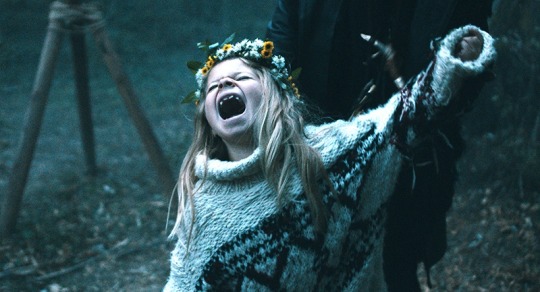
Gebbe won Best Director in the main competition at Fantastic Fest, and it would have been a crime if this were otherwise. Her control over what are essentially forces of nature is humbling. Extracting a profoundly moving drama from a cast of adult actors is challenging enough on its own, but to get these terrifyingly convincing performances from children, evoking deep trauma and physical violence to self and others, is another level. As if this weren't enough, Gebbe adds animals into the mix, giving the story of Raya a parallel in the troubled career of a police horse who is considered a lost cause by all but Wiebke. The training scenes in which Wiebke guides the volatile animal through fire and smoke, while her own lifeforce is being progressively depleted by her new child, are as harrowing as anything having to do with parenthood, and Wiebke seems to take the horse just as seriously as her child. Friendly single dad Benedikt (Murathan Muslu) tries to flirt with the trainer by remarking on her unusual career, but she spits bitterly, "The horses are not the problem," giving us a glimpse of the philosophy that drives her.
Another of my favorite german films is Werner Herzog's 1976 short NO ONE WILL PLAY WITH ME. This funny and poignant story involves a bullied and neglected little boy, and it is preceded by a card displaying the adage "There are no bad children, only bad parents." This is the principle that drives Wiebke in work and life: Those who are seen as failures, have been failed by others. One has the sense that Wiebke sees herself in these wretches. She has no partner, and balks at questions about her relationship history, shying from physical affection even with people she knows and likes. A tell-tale scar graces one cheekbone; when she finally begins to welcome the benign Benedikt's advances, he strokes it instead of kissing her, acknowledging that he can see who she really is.
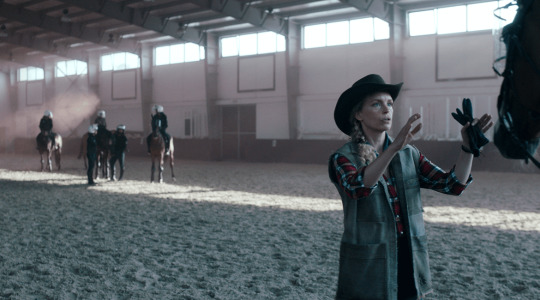
Wiebke tries to extend this same empathy toward Raya, refusing to let the child bait her into wrath and rejection. However, this show of pure faith and tolerance does not work, and the right approach becomes less clear as Raya begins to blame her mounting acts of vandalism, arson and assault on an evil entity that controls her will. A psychiatrist aprises Wiebke that this is the "magic period", in which the child uses magical thinking to divert feelings of guilt and responsibility. But, after a fashion, Wiebke begins to sense this malevolent presence as well. Is this etheric intrusion real? Or is she beginning to empathize with the child--with the experience of grappling with a damaged part of yourself--to the point of dissolving boundaries?
The title of the movie refers to a fable about a pelican whose chicks die, and she resurrects them by feeding them her own blood. This is a clear metaphor for Wiebke's trial with Raya, that becomes shockingly literal when, after endangering her home and relationships by prioritizing the new child, Wiebke places her own health on the line by taking an unregulated drug to give herself a bizarre advantage. When Wiebke discovers the shocking nature of Raya's original trauma, she experiments with the radical idea of treating the girl like a little baby, hoping to start from square one with her capacity to be mothered, and in the service of this dreadful proposition, Wiebke starts taking a lactation-inducing pill that proves to be an immediate risk to her health, and puts her in an even more perilous position with Raya.
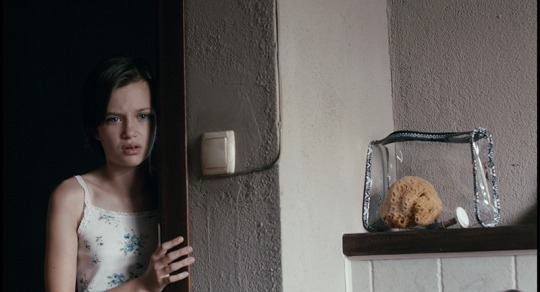
Although it focuses on a preternaturally devoted mother, PELICAN BLOOD recalls what makes movies like HEREDITARY and WE NEED TO TALK ABOUT KEVIN so potent. We have the idea that in becoming parents, we are perpetuating our own essence, extending our history and celebrating the precious connection of blood, which is supposed to impart an automatic same-ness. Unfortunately, this only shakes out to arrogance for many, denying the quirks of psychology, chemistry, and the unique impact of trauma--even if minor, or explainable as something benign--on a mind too young to fully comprehend the nature of the experience. Even without abuse in the home, anyone can have a child less like themselves than they could have ever imagined, for reasons beyond their own control. In all this, the child is innocent, and it is the duty of the parent to prioritize the child's feelings, over the vanity of wanting an heir to your own best qualities. Wiebke sacrifices not only her vanity, but potentially her very life, to show Raya love. When this blood sacrifice does not work, Wiebke finds herself facing the realm of alternative belief as a last resort.
The introduction of PELICAN BLOOD's folk horror element can seem a little left field, if you haven't noted the clues scattered throughout the film. Before the revelation of Raya's boogeyman, Wiebke begins to discover evidence of an old pagan tradition still being practiced around her proverbial neck of the woods. Soon, she tentatively entrusts herself and her child to a local witch, who puts them through a harrowing exorcism. Though the process is uncertain at first, its impact forces Wiebke into a direct acknowledgment of the entity harassing her daughter. And ultimately, it awakens in Raya a capacity for love.
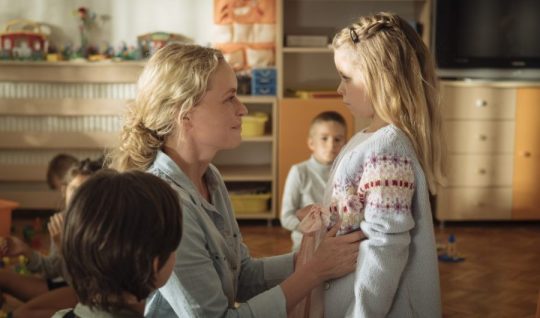
While the reality of the supernatural in PELICAN BLOOD remains in question, I think the effect of this ambiguity is specifically meaningful. I usually scoff at any type of "was it all a dream?" nonsense, as this is a tactic employed by directors who think their greatest accomplishment should be getting one over on the audience. I don't see any inherent value in simply reversing the apparent meaning of things, just to make people feel stupid--and worse, this has trained modern audiences to try to defensively predict the least likely ending to any story, instead of just engaging with it emotionally as it plays out. For this reality-bending trick to be worth anything, one must be able to answer questions like, IF this was all a dream, THEN what meaning is added to the story?
In PELICAN BLOOD, the unresolved question of whether magic is real is of great relevance to the whole concept of belief. Human beings crave extranormal experience; we're deeply attracted to tales of ghosts, UFOs, mythical creatures, and parapsychological abilities. Even the skeptics among us enjoy arguing about these things, and many regular folks without eccentric interests read their horoscope "just for fun". Most telling of all is the enduring popularity of stories about the strange and unusual, which require no particular belief system from the audience; the fantasy of this extra dimension to our mundane lives is just so satisfying. Despite all the pleasure we get from these ideas, though, we tend to cling first and foremost to objective truth; we tell ourselves that if there is no "proof", then an outrageous thing cannot exist. But, this is actually contrary to many of our lived experiences. On the basest level, we delight at videos of insane parkour stunts, at the same time that we say these guys are "like" superheroes, but are actually just guys. My question is, what's the difference? If a person can achieve physical feats that most of us can never imagine attempting, then what difference does it make that this person was not bitten by a radioactive spider? If a fortune teller in a carnival is so good at "cold reading" strangers that she gives the effect of being able to read minds, then what is the appreciable difference between a carny and a "real psychic"? If a faith healer "just convinces" someone to become free from a chronic ailment, and the patient goes on to live a happier life, who cares if no "real magic" was in evidence? What is the difference between exorcism and hypnosis, if the end result is the same for a seriously disturbed child and her mother? The only difference appears to be some material confirmation of specific mystical forces and substances--which, admittedly, would be exciting on its own--but this would still only be an alternative version of the events that led up to the same "miraculous" result. We only worry about the existence of God and magic because our definitions of these things tend to be limited to what we think of as literal and scientific. But, if the correct effects manifest themselves, then all that is purely cosmetic. Belief is real. Faith works.
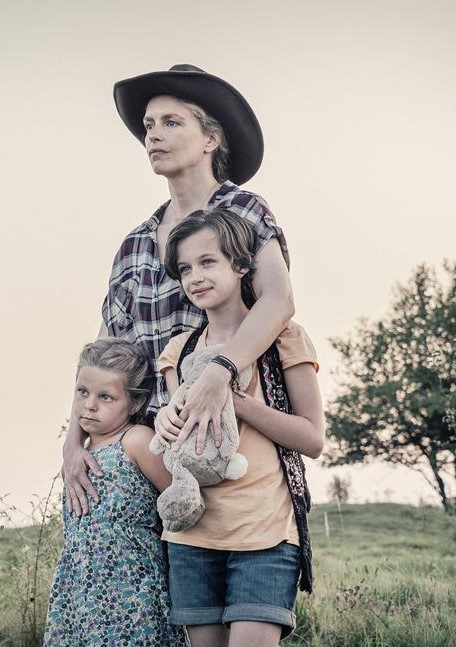
#blogtober#2020#pelican blood#pelican blood 2020#katrin gebbe#nina hoss#Adelia-Constance Giovanni Ocleppo#Murathan Muslu#Katerina Lipovska#drama#folk horror#witch#witchcraft#exorcism#possession
9 notes
·
View notes
Note
Okay so about the post where they miss Jekyll and you clarified that Jekyll isn't gone-gone, just is currently Hyde, but then mentioned that they know any sip of hj7 could be the last... might.. mightn't we.. get some a n g s t... of The Last Sip and when the gents all realized it's The Last Sip?
((Slight blood and what I think still counts as body horror warning.))
Lanyon and Utterson waited patiently in the former’s laboratory, which he had fashioned over the years into a nice little area perfect for taking care of one specific little problem. A knocking on the window announced said problem’s arrival.
Lanyon stood up with a huff and opened the window.
“‘Ello,” said Hyde, peeking in, “Sorry to have kept you all waiting, I got… held up a bit at the pub.“
"You need not explain, Edward,” replied Utterson, “Your bruised cheek and swollen lip say everything.”
Hyde chuckled as he climbed inside. As per the routine, Hyde would go out every other night to let himself go, and then return to the safety of Lanyon’s lab to change back. He freshened himself up and changed into Jekyll’s clothes, which still smelled of his cologne, and Lanyon handed him a vial of that glowing green formula, the same specific recipe that had been so reliable for several months now.
That formula had always worked well. Very few side effects, the transformations were less painful and random transformations were less frequent, and he always changed back just fine. He swished it around in his hand, watching the little bubbles sparkle. Then, sitting down in a chair for comfort and minimal chance of injury, he took it all down in one gulp. He set the glass aside, and waited.
And waited.
And …waited.
“That’s… taking a bit long, isn’t it?” asked Utterson, attempting but failing to hide his concern.
“What did you eat?” asked Lanyon, “What you ate could’ve affected the… effects.” He was less articulate than he usually was when it came to medicine, likely due to just a little panicking.
“Nothing I haven’t had before. I hardly ate anything – hardly drank anything!” Hyde was the worst at hiding his fear. He was never good at keeping his feelings inside.
“Now, now,” started Utterson, “I’m sure it’s just taking a bit longer than usual and will… surely start working very soon.”
And so they waited a bit more. Lanyon shifted where he stood, Utterson drummed his fingers on his lap, and Hyde bounced his leg.
“Wait,” he said, “I think I feel something…"
Utterson sighed in relief. Lanyon, being a scientist, began questioning him "W-What is it? What do you feel?”
“Uhhh…” Hyde skimmed his mind for the right word, sweeping his hand for emphasis, “I-I feel… something…”
“SPIT IT OUT, MAN!!” shouted Lanyon.
“GIVE ME A SECOND!!” Hyde shouted back.
They waited with baited breath, they’d never been excited to see a transformation before. Utterson sat on the edge of his seat, Lanyon leaned towards Hyde, all were waiting and hoping, but terrified that no payoff would come.
Hyde held up a finger, he shifted a bit… and loudly burped out a puff of green fumes.
Lanyon grimaced at him, “That wasn’t funny, Edward.”
Hyde threw up his arms and glared at him, “I’m not trying to be funny! I’d never joke about this!” He stood up and went for another pre-portioned vial of formula, “I just need a little more, I think-”
“Is that safe?” Utterson cut in, standing up.
“Probably not,” answered Lanyon, lifting the vials out of Hyde’s limited reach, “especially not so soon. We have to wait for something to happen.”
“For what?!” Hyde yelled, jumping up to reach the vials.
“Something more than a burp!” he snapped back, pushing him away.
Utterson sat back down, trying to compose himself. It was fine, everything was fine. Just a small hiccup, he can have a different vial soon, everything will be fine. He’ll change back into Jekyll and… Oh what he wouldn’t give to see Jekyll again. It hadn’t even been a day, but when your dearest friend literally doesn’t exist for a few hours, it makes you miss them a little more than you would normally. He looked at Hyde, still hopping up to grab a vial from Lanyon. He was wearing Jekyll’s clothes, the white didn’t really suit him, or maybe it was the way it all hung from his frame. It was so wrong, so very deeply wrong. This may be the closest to Jekyll he may ever be again.
Utterson tried to push that thought from his mind, but the longer he looked at Hyde, still unchanging, still Hyde, still not Jekyll… it made him feel sick.
Hyde stopped jumping, he let out a soft gasp, “I think…”
Lanyon started to interrupt him, “If this is another burp I will-”
Hyde doubled over in pain, clutching his stomach. Utterson and Lanyon felt only a little bit shameful for being excited about that. Hyde fell over, his veins bulging and turning black as his mouth began filling with green foam – all of this being perfectly normal, nothing strange yet. Blood started leaking from his eyes, nose, ears, mouth – also perfectly normal, nothing to worry about. He coughed, groaned, shook and moaned, his hair started to stick to his now sweat-soaked skin… and then it stopped. The black in his veins faded and the sickening purple returned to his skin. He held out his hairy, clawed hand for a handkerchief, and Lanyon handed him one. He wiped his face and… nothing… nothing had changed at all. There was no bone crunching, no blacking out, no gargling, no actual transforming. It hadn’t worked.
“What…” Utterson stared at him in shock.
“No, no, no,” Lanyon said, his booming voice tense, “you’re supposed to be tall, and old, and less weird looking-”
“Hey!” Hyde snapped, glaring up at him.
“I DON’T CARE ABOUT YOUR FEELINGS RIGHT NOW, YOUNG MAN!!”
“WELL, MAYBE IF YOU COULD MIX THE FORMULA PROPERLY THIS WOULDN’T BE HAPPENING!!”
“Let’s not go bLAMING EACH OTHER, NOW” Utterson cut in, startling the others with his sudden yelling. He took a deep breath, “My apologies… Edward, if it would make you feel better, why don’t you mix a fresh vial, hm? To make sure you don’t miss anything.”
Lanyon scoffed, “I am perfectly capable of mixing chemicals, Utterso-”
“This is not aBOUT YOU, HASTIE!!” He shouted back, far angrier than the others had seen him in years.
Lanyon looked down in shame.
“… I’m sorry, Lanyon…” Utterson said, “I’m just… a bit distressed at the moment.”
…Hyde took his supplies and started mixing a new batch for himself. He poured himself a proper potion with precision, and drank it down.
They waited.
And waited.
And it happened again. They didn’t have to wait as long, but the result was the same as before. No transformation, just a lot of pain. No limbs stretching out, no organs rearranging, no hair falling out, no Jekyll.
Hyde lay on the floor in his own sweat, staring up at the ceiling, chest heaving as he recovered from his non-transformation. “Why isn’t this working…?” He asked, but it didn’t seem to be directed at anyone in particular.
Utterson’s blue eyes grew wide and misty as they darted around the room trying to find something to fix this, but he saw nothing that he could make sense of. Lanyon surveyed the materials on his tables but could only think of trying again, though that could prove deadly if done too many times. Hyde finally sat up, joining them in looking for something, a solution, an instant fix, a sign from god, anything at all… but none could find anything they hadn’t tried before.
Hyde began stumbling about the room, picking up glass after glass, box after box, turning them around and pushing them aside. He had gone around the room almost three times before the others noticed his eyes had starting welling up.
“There has to be… has to be something… please… this can’t be… can’t be true… must be something here…” he whimpered. They had never heard him sound so helpless before. For a moment, the gravelliness was gone and he almost sounded like Jekyll again.
When that thought struck Utterson he let out a sob and buried his face in his hands. He could see nothing but his eyelids but he could hear Hyde growing more frantic, pushing things off of tables and punching walls only to recoil in a fit of frustration and anger. In some sad way, it reminded him of Jekyll, and that only made Utterson cry harder. He remembered when Jekyll started deteriorating while working on his formula, maybe if he’d done more to help this wouldn’t have happened. He thought about those times Jekyll would disappear for days on end and wondered if he should’ve checked on him then, if maybe that would’ve done something. He remembered when Jekyll would change part of himself suddenly after behaving oddly in the days prior, perhaps that was a sign of darker days to come. He thought back to how strange he had been in his youth, how wild he’d be, how free he always seemed, he wished he could’ve brought those feelings back to his dear friend. He remembered in perfect detail the day they met, perhaps if Jekyll had never greeted him so kindly and smiled so sweetly… perhaps it would’ve spared Utterson all this pain.
Lanyon sunk down to the floor, his face pale and eyes staring deeply into nothing. He thought about the past few years, how Jekyll had almost killed him after revealing himself to be Edward Hyde, and how Utterson had brought them together again. He thought about the awful experiments he performed, the successes, the failures, the hugs, the hatred, everything that had gone right and everything that had gone wrong. He thought of his university days, of how he met Jekyll in the first place. He thought of how strange he had been back then, but how brilliant. He thought of the games they’d play, of the secrets they’d share, the bear hugs, the handshakes, the jokes, the gossip, everything that would never again be possible. Not after this, never again.
They wondered if death would’ve been easier to deal with, but knowing that Jekyll was still there somehow, trapped inside the body of this twisted, murderous version of himself, completely erased from physical existence, never to be laid peacefully to rest…
Utterson slid out of his chair and fell into a sobbing heap. Lanyon’s face ran with tears as he let out an enormous scream. Hyde stumbled over the mess he’d made and fell, wailing and crying out in desperation and terror.
“Please!!” He cried out, choking on his tears, “I want to be Jekyll again!!” He fell over, sobbing until he was too exhausted to move.
“I want to be Henry again…”
#fg's writing#jekyll and hyde#the strangest case#gabriel utterson#hastie lanyon#edward hyde#fg's utterson#fg's answers#fg's lanyon#fg's hyde#asks#the last sip#body horror#blood
90 notes
·
View notes
Text
It’s 2020 and my anxiety level is so high, I grind my teeth while I’m asleep and awake! But let’s ignore all that and instead focus on critically analyzing America’s premiere soap opera for monster hunting! It’s Supernatural!
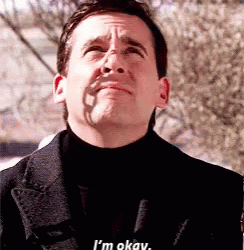
As you may have already guessed, I watch a lot of TV. And in the Year of Our Troubles, 2020, when I’m encouraged to stay home and indulge in my favorite pastime for the health of the nation, I watch a hell of a lot of TV. When you watch that much TV, you start to notice the rhythm and the flow of how seasons of television progress. You probably notice it too, even if you don’t think about it as much as I do.
Like, you know that episode that happens right near the end of the season where all the characters are happy? They’ve overcome a whole bunch of obstacles and they’re finally winning and they can see that light at the end of the long tunnel? You know the one I’m talking about. That’s the moment that you, as an audience member, know things are about to go downhill very quickly
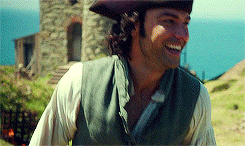
Like when Poldark smiles over something and you’re just like, ah yes, I’ll prepare for the funeral.
Season 1 of Supernatural is like a case study of the rhythm that makes a network show work. There’s this wave effect throughout the season, building the tension up for a few episodes and then sliding through the next handful. Look at the first five episodes: they’re all about holding our breath, we’re gasping at every new turn - death and ghosts and monsters and Family Drama and Bloody Mary and PREMONITIONS AND THEN we let it out over the next three.
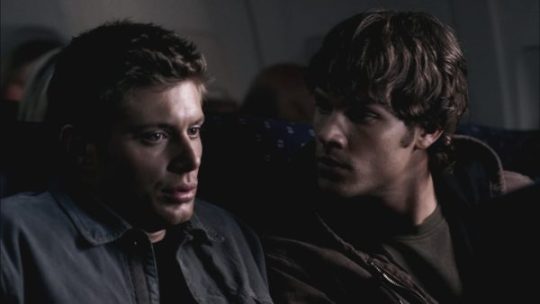
Aaaaaaand exhale!
This first season especially, but I’d argue the first three definitely, you can see this pattern repeated over and over again - building the tension, ramping the horror, bringing it to a major Mythos or Series Arc Moment and then releasing all that tension with a cool-down filler/self-contained episode.
And that’s where I am in the show now. We just had a major series arc episode with “Shadow” - John finally reunites with his sons, the villain is revealed (Meg and also the demon that killed their mom), and the endgame (for this season at least) is in sight. BUT! We’re a network show with 22 episodes to fill, and we can’t just head straight into the Finale Fight now, we’re only on episode 17! I mentioned in my last post that getting the team together again for all of 6 minutes and 44 seconds (yes, I did go back and count) felt like a slap in the face. I assumed it would have something to do with Jeffrey Dean Morgan’s shooting schedule, but looking at it again, it probably had more to do with the fact that it was too soon to bring John Winchester back as a major player.
So our next episode, our breather episode after all this High Drama, should feel a little disappointing to anyone caught up in the arc of the season. But. BUT. But. The next episode is “Hell House."
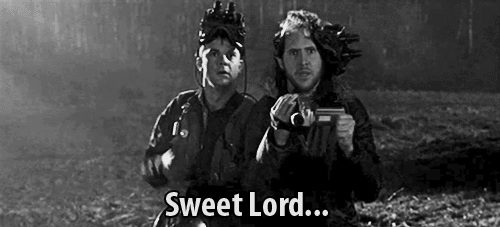
Yes, this is a filler, but this is filler done RIGHT. I mean maybe it’s just cuz it’s 2020 and I’m very tired and sad and scared all the time, but I was SO HAPPY to see Ed and Harry again, guys you don’t even know. Guys, the GHOSTFACERS ARE HERE!

And man, I am SO glad that this is a recurring side team that shows up throughout the series. Pease no one tell me that they die in a later season, I’ll find out eventually, I just can’t handle it now.
They are the anti-Sam and Dean. They have no idea what they’re getting into, they have no idea how to hunt anything, but they’re here to get famous and that’s just...it’s beautiful guys. Just beautiful.
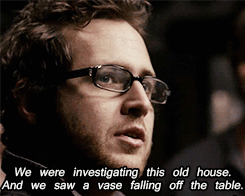
Plus, you have this soft b-story line where Sam and Dean get to be Real Brothers for a hot second and prank the shit out of each other the whole episode. It’s like even Sam and Dean are saying, yeah, we need a break from all the feelings, let’s put itching powder in each other’s boxer briefs. I want to say that I was really annoyed the first time I watched this and did not care for these shenanigans, but this time around, it was a REAL JOY.
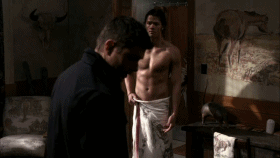
I’m also not mad about this.
And this breather feeling sort of carries over into the next few episodes. Sort of.
“Something Wicked” is another feelings-heavy episode. Backstory! Child-eating Monster! Tiny!Dean! I think Dean maybe cries again? Or just does that thing where he stares into the middle distance, all pain and torment and chiseled jaw line and I’m doing it again, I’msorrynotsorry.

You know. THIS face.
All of these things lead to an episode that has a lot of character development and strengthens the bond between Sam and Dean. Sam literally validates Dean’s whole existence by apologizing for fighting him on this job and then saying “I know I’ve given you a lotta crap for following Dad’s orders, but I know why you do it.” It’s a lot. It’s a big moment from Sam, who hasn’t really reconciled with John yet and who’s still hoping for a future that isn’t all about killing every evil sonuvabitch they can find. It’s a big moment for Dean, too, since his main motivation is protecting his family and (from his limited point of view) that family keeps trying to leave him. And while we do get some insight into the f-ed up childhood that was forced upon our eponymous heroes, there’s nothing really driving the season’s plot forward in this episode.
Same goes for “Provenance”. This episode is another good horror episode. I mean, even if that painting wasn’t possessed by a murder orphan, it is deeply haunted and I hope props burned it when the production wrapped. And what is it about ghost children particularly that’s upsetting? Is it the size? Is it the fact that their eyes are too big for their heads at that age? I mean, it probably has something to do with perverted innocence and goodness blah blah blah, but also their hands are tiny and so all the knives look bigger.
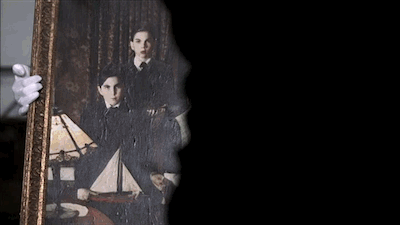
Same, Sam.
Aside from that, Sam gets another nice growth moment where he gets to imagine a world after Jessica. He’s been so fixated on finding Jessica’s killer - I’d argue more so than his mother’s killer albeit they are the same entity. That’s not a judgement against him, mind. He knew and loved Jessica, he did not know his mother, so I’m not mad about that character decision. But the show is really wrapping up the Jessica plot line because that won’t have legs in a season 2. And that’s harsh, so I’ll temper it with the fact that Sam, as a human being, is getting to the final stages of processing his grief and starting to move on with his life. Plus, I think that Dean wingmanning his brother is adorable and I love it. Good Brothering, Show!
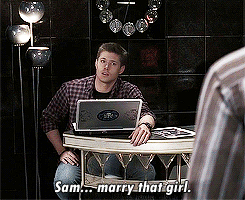
But nothing in this episode has anything to do with the killer Sam’s been fixating on, so there’s no progression for the season’s main arc.
Last but certainly not least on this disc of my season 1 box set is “Dead Man’s Blood.” My notes on this episode include the key phrases “I’m pretty sure this episode is...dumb?”, “ I...do not care for vampires,” and then like, two lines later, “Nope. Still don’t care for these vampires.” They’re just making up some random-ass lore and their fashion sense is SO 2006 and I just...I just hate them.

I hate them SO MUCH.
BUT! That’s not the point of this episode. The point of this episode is to point us towards the season finale. FIRST, we start to see a little bit more of the world that the Winchesters inhabit. We actually meet another hunter, Daniel Elkins. He dies immediately, but that’s a cold open for ya. And when Sam and Dean go to investigate Elkin’s death, John comes back, this time for good (haha, lol). We get a real taste of the family dynamics in this episode - John and Sam fight and come together and fight and come together and Dean’s standing there kinda like, SPONGEBOB!
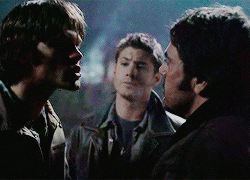
You know, Plankton! Krabs! Dean Winchester! Right? Anybody?
All sides have good arguments, and I appreciate that none of the conflict between the the three of them feels forced, or at least, it doesn’t feel forced this watch. The fights all come from deep character places that have been established through the whole season. They’re natural progressions of what we’ve come to expect of these characters.
And finally, most importantly, John knows how to defeat the demon that killed their mother. Enter Deus Ex Colt Revolver.

Colt Revolver Ex Machina?
CAN I just take a break for a second to say that BOTH Elkin AND John were ready to WASTE PRECIOUS COLT BULLETS on VAMPIRES, who can be killed IN OTHER WAYS?? Listen, you make a magic gun that only works with these like, 5 BULLETS, and then you just THROW AWAY A BUNCH OF SHOTS, GUYS??? ALSO, what the HELL does Haley’s Comet and The Alamo have to do with this STUPID GUN??? I JUST- you know what, we don’t have time for all that.
Attaining the Colt is the brick they drop on the gas pedal to drive us into the season finale of season 1.

Wasting a some PRECIOUS F*CKIN’ BULLETS, GUYS.
When you look at the season’s pacing at the outset, it seems like it shouldn’t work. I was that person who felt disappointed in each episode where it became clear we were definitely on a side quest, not the main quest. Watching it now, though, I think that pacing is important. Yeah, the Monster-of-the-Week episodes are a little hit and miss, but sometimes you have to think of a TV season like a marathon and not a sprint. There will be times when you pick up the pace, yes, but it’s a long race and you’re gonna need some periods of recovery if you’re gonna make it to the finish line. And frankly, a lot of those side quest episodes ended up being my favorite episodes of the entire series.
NOW. I doubt you would see this sort of structuring in a show today, specifically in shows that don’t get a 22 - 24 episode order. You MAY get, MAY, a Ghostfacers-type episode thrown in after a major emotional climax for that breather effect. MAY. But if Supernatural was made today - probably for an online streaming site, probably with only 10 - 13 season order - I don’t think you’d see episodes like “Something Wicked” or “Provenance” or “Faith”. The nice thing about short seasons is that you can keep the storytelling focused and tight, but I also think that can be a weakness as much as it is a strength. What do those three episodes all have in common? They’re strong on character and relationship development. We, the audience, get a deeper understanding and appreciation of the Winchesters and how they work and grow as a unit in these episodes. So if we’ve watched this far, through bugs and ghost trucks, through all their little victories and major setbacks, we’re well and truly invested in how the season is going to end.
I’m not saying you can’t have big character moments in a shorter season. And I’m not saying that a show more focused on plot, on the What Happens rather than the Who It Happens To, is a bad thing. But watching this season over again in comparison to present day television seasons, it’s highlighted what Supernatural did right. On this side of the series, it’s easy to see why the show went on for another 14 years.
#Supernatural#Supernatural Season 1#Sam Winchester#Dean Winchester#John Winchester#Hell House#Something Wicked#Provenance#Dead Man's Blood#cw#WB#Televsion#Television History#15 SEASONS#And this is where it all started
2 notes
·
View notes
Text
Sangria Wine

⊸Pairing: BTS Yoongi ⇆ Reader
⊸Genre: Vampire| CEO| Medical| Fluff| Angst| Slight Horror
⊸Summary: When rent is cutting short and you’re at your last resort. Your job has been cutting your hours slowly, and bills were stacking up. You walk into a donation center, blood donating center for the undead to earn some quick cash, but…the thing is…you’re afraid of needles.
⊸Word: 6.1K
⊸Rating: teen; mentions of blood and phobia of needles/blood, fainting, vampiric activity, and mentions of mating.
⊸ A/N: Based on my experience with needles and how I’m a wimp and pass out. This Yoongi is pretty cliche, but I mean who doesn’t love a good angsty Yoongi. Thanks for reading! Gif source unknown, but I don’t take credit for it.
→ Masterlist | Moodboard | Next

The nurse takes the earpieces of her stethoscope out of her ears and tilts her head, “Your blood pressure is still high.”
You shy away from her look of concern, this is embarrassing. After waiting ten minutes for it to go down, the results are still the same. It won’t go down from a static 140/80, you know that, “Doctor offices just make me nervous, I’m fine.”
She hums and writes down a note on your chart. Finally she puts two and two together, “White Coat Syndrome,” clicking her pen on her clipboard, “it’s when patients, much like yourself, are anxious because of the people walking around in white coats.”
You halfheartedly chuckle, “Yeah, haha, that’s the one.” You hear it every time you come in to a doctor’s office. You tried explaining it to her earlier, but she put her stethoscope in her ears instead determined it was just a mechanical error.
The hypertension is never because of the doctors, but the needles—bloodwork specifically. Your mind and body are disconnected. You know it isn’t a big deal, it’s a split-second ordeal, boom, bam, done! It’s not even that painful, it’s a mere pinch at most, but for as long as you could remember you’ve had this issue. Although the fainting didn’t start until your teen years, mostly because the nurses offering you candy wasn’t enough to distract you anymore. You even know the symptoms of an oncoming episode by heart now: hearing dulls to a high pitch ring, sudden rise in body temperature, blurry vision then timber you’re out like a light!
Even though you’re aware of the rational side of it, the anxiety is still there.
Your hands feel clammy, as you repeat the words to yourself with a sigh: White Coat Syndrome.
This is your first time at this clinic, so they don’t have that special, little note on record. Which ironically is a good thing, you couldn’t be honest with her and tell her it was because of the needles that perturb you…and that you are likely to faint. You need to be here today.
The nurse wraps her stethoscope around her neck, “Alright, Ms. Y/L/N, everything checks out. I’m going to ready a room and I’ll be back in a moment your receiver should be here soon.”
You nod and she is gone with a click of the door. “He should be here soon,” those words echo in the back of your mind. You busy your mind on something else by reading the posters around the room. They are typical ones the importance of getting the annual flu shot, hygiene and information on human diseases that can affect vampires and other supernatural. You let out a heavy sigh as you read over them three then four times for the sake of not driving yourself crazy. It occurs to you that not only do humans have a huge effect on the environment, but now we’ve effected supernatural beings. Way to go humans.
Three knocks on the door interrupts your reading and the nurse peeks back in, “Are you ready Ms. Y/L/N?”
You wipe your sweaty hands on your jeans and slip off the examination table. You stand still for a few seconds to stabilize your feet. You grab your coat and squeeze it as you respond through a fake smile, “Ready.”
Your feet were leading you down the endless white hallways instead of your overactive mind. The mild ringing in your ears were dulling the noises around you, so you follow the nurse like a lost puppy. Suspiciously this place smells overtly sterile, even to your non-supernatural nose. It’s probably because of all the…blood. You hold your coat tighter to you, “Shut your mind off, shut it off, positive thoughts only.” You could already feel your face flushing from the self-induced anxiety. You keep repeating to yourself like a mantra, “It’s going to be fine. Nothing bad is going to happen, why do you do this to yourself? You know you’re going to be alright.”
You don’t realize you’ve made it to the phlebotomy ward until the nurse you are following opens a room for you. You thank her, and walk into the room rapidly. You take in the new, small room and it was far from what you were expecting. It’s nice…it lacks the same clinical posters from the checkup room and instead it’s replaced with minimal décor. It still smells very sterile though. The nurse speaks from the doorway, “Your receiver will be with you shortly and when the session is over I will come back to check up on you before you leave.”
She closes the door behind her with an eerie click. You heavily sigh as you slump into the first seat you see when your legs give out. Your head is chaotically buzzing, and your heart is beating so hard you could feel your pulse drumming in your ears. This was probably a bad idea—this is a bad idea. You shook your head clearing your thoughts again, no, this was a good idea. You could do this. You could do this! You straighten yourself out and sit near the edge of the seat, tuck your feet together and set your spine rigid. If your receiver will come in here any minute you need to be a bit more put together. If you put it out in the universe it will come true kind of mindset.
The supernatural are apart of normal society, they live amongst humans. They work, live and function alongside humans. You’ve never been nervous about vampires, or any supernatural being, but today those fangs hold a different emotion.
You breathe in slowly and deeply to make sure you are still breathing. If you aren’t actively thinking about it you would probably be turning blue by now. Inhale and exhale. Inhale and exhale. Inhale and exhale. Inha—three, soft knocks rasped against the door. If I hadn’t been so hyperaware of my breathing I probably wouldn’t have caught it. I jump in my seat then stutter out, “C-C-Come in.” Wonderful, just a wonderful first impression.
A tall, lean figure slips into the room with his back turned to me with his head down. He is dressed professionally with a navy-blue button down and black slacks. Your eye follows his silhouette to his hand strangling the handle of his brown leather briefcase. His briefcase isn’t fully close and a few documents are sticking out of it front pockets. Is the vampire nervous or just…really hungry?
When he turns around, lifting his head, his expression is stoic, lips thin like a line giving away no hint of reaction. You hold your breath when he flicks his half-lidded eyes up meeting yours. His deep, brown predatorial eyes watch yours, observing you from head to toe. It is as if he is waiting for you to break contact first. You feel your saliva thicken in the back of your throat as you struggle to say a greeting. Never before had the mere presence of someone take your breath away. His dark eyes convey his prowess as a vampire, establishing his role in this transaction right away. His naturally dominant aura penetrates the room replacing the ethanol out until all you could smell is his earthen cologne.
Even though you feel insecure under his gaze, you couldn’t help but keep your eyes lock with his. There is an unexplainable pull that keeps you in those two orb’s gravities. He is very attractive to say the least. You swallow hard. Did he have to be good looking? It made your phobia infinity more embarrassing. He had a face that would haunt your dreams and nightmares.
Your eyes broke contact when he watched my throat bob and he knew I had swallowed. I turned away from his gaze and tried wiping away at the blush staining my cheeks.
Just your luck.

After four hundred years you would think he’d learn his lesson by now. He should have perfected the way to living, however, he always forgets that there’s a chaotic variable that ruins perfection: humans. They’re creatures that put too many factors into the pot and it spoils the broth. Things should be simple, but they never are. Things always ends up being troublesome on his part.
He’s spent the last few weeks stowed away in the boardrooms and his office working on a big project. Today, he closed the deal with the international broker and will start importing overseas. Everyone wanted to celebrate the billion dollar deal but he ditched the investors and other executives in order to make this appointment. He didn’t care if ditching them only deepened the rumors about him, he owns the company. He knew his reputation, he even knew the vicious nickname the employees whispered. They called him the red shadow. He was infamously known to be cold, calculated, and a perfectionist. When the red shadow walked to and from meeting rooms, the employees would stop what they’re doing and tremble in fright. Not always literally, but he’d hear it in their frantic heartbeat or the sudden pungent smell of ammonia from stress. They worried that they were going to be scrutinized or that they would be the next on his list. His eyes would hauntingly burn crimson when he was stressed. Despite supernaturals being amongst the normal, prejudice still ran deep. A vampire’s reputation ran deep and was naturally synonyms with fear itself.
In the past two weeks he had reaped the nickname dry. He hadn’t feed properly, and the iron pills weren’t keeping the hunger at bay for more than a few hours at a time. Synthetic Blood bags wasn’t able to truly fill that want for fresh blood either. Normally he liked to feed from a live source every two week, but that didn’t fit his schedule.
As soon as he knew the deal was closing, he made his secretary set up an appointment at the clinic for today. He couldn’t have felt more relieved when he got confirmation email a few days ago, and it’s been the only thing he’s looking forward to. He could’ve brought a donator to his office, but he doesn’t eat and work in the same room and well…it was against the law. Congress forty years ago drew up legislation for stricter guidelines on blood donating and receiving. This was all because too many individuals were found dead as a result of careless feeding. This also forced the supernatural to come to light from the underground. Under the law he was required to feed at a clinic or contract a donator through the government. Humans, he mentally scoffs. The idea of contracting someone revolted him. Although his clients were never usually unpleasant, but something was always off with their scents, too talkative, or just…creepy. He’s never wanted to rely on anyone for anything, especially concerning sustaining his life.
He walks up to the front desk and signs in and takes the typical swab test from the nurse. He swabs the inside of his cheeks quickly and tucked the swab back in its sanitary wrap it came in. He hands it back to the lab tech waiting behind the receptionist. His head is pounding furiously. He runs his free hand through his hair trying to feel for a source. It isn’t painful, but an annoying hard and fast thrumming…almost like a heartbeat.
He is brought back to his senses when the receptionist sweetly smiles at him, “Thank you Mr. Min, please wait a moment and we will begin shortly.” He harshly blinks and picks up his blazer and briefcase finding a seat in the empty waiting room without further word. He deduces that it isn’t another supernatural creature influencing him. Why is his head pounding then? He sits back in his chair and laces his hands together in his lap and takes a deep breath. He rolls his neck as he lets the feeling take over.
Throb, throb, throb, throb.
In the silence of the waiting room he hears it. It’s faint but it’s there. He tunes into the erratic heartbeat that’s somewhere in this building. He holds his breath for a moment to see if the delicious rate matches up with his pounding head.
Lub-dub, lub-dub, lub-dub.
He groans under his breath and licks his lips. The animalistic side to his supernatural tendency is creeping up his throat. He’s never felt so connected to a heartbeat before. His body feels like its crawling with jitters for not seeking it out. His leg begins shaking, he slaps a hand on his tight forcing it to stop fidgeting. He suppresses his instincts to follow the pulse to its owner with all his might. The walls are well insulated for the sake of privacy, but he could feel it so viscerally.
He is about to groan under his breath again when he heard his name being called. He takes a deep breath in and lets his expression fall neutral again, except the bags under his eyes gave away that he is a starved man. He gets up as calmly and follows the petite woman who has similar bags under her eyes as much as she tries smiling through it. That’s what happens naturally when humans force switches their biological clock to nocturnal. “Hello, Mr. Min, please follow me over to the oral cleaning station.”
He follows routine, but as he is cleaning his teeth with the sanitation elixir he feels the pulse beating in harshly his fingertips. He nearly spits out his mouth wash as he feels his fingertips tingle like when they go numb, but you try using them again. The thrumming of energy in his veins makes him lowly moan but he wills it away as by gargling the disgusting mouth wash.
He is clean, but he knows this procedure is also a part of the new act. Human to vampire disease is on the rise, but so is vampire to human. Today following routine is agitating him. He wants to feed, no needs, so that he wasn’t hyperaware of a heartbeat. In order to save his pride he concludes that he is just aware of it because he is starved. He was stuck in the office so long that he must be hallucinating. His senses were overreacting because all he’s had was fake plasma and he wants the organic supply. He is in control, not the salacious pulse. He knows himself better.
He spit out the mouthwash into the sink with disgust and rinses his mouth out with water fast. He wants this done and over with as soon as possible. Sleep, sleep would do him so well after this.
“Follow me Mr. Min, your donor is waiting for you,” he grunts then follows the nurse down the familiar hall to one of the many donating room. The white walls he had seen for years now feels unfamiliar, just as new as the sensation running through his veins. It irked his ego that this is throwing off every one of his senses. He isn’t sure he is following the nurse or his instincts anymore. He unexpectedly groans when he feels a strong beat in his own chest. The nurse turns around with an eyebrow raised. He finishes that groan off with a cough, bring a hand up to his mouth to conceal it politely. The nurse smirks thinking the insinuation is for her. He rolls his eyes as she turns back around.
They walk past rooms and the harder the pulse feels in his veins, chest, and fingers. Its engulfed him and its all he can feel. The nurse stands outside a door and slips a chart into the folder. He stares at the door because itself seemed to pulse. He knows whomever the owner is of the bothersome heartbeat is inside this room. The nurse knocks softly and she steps back, “You have fifteen minutes Mr. Min.” He didn’t respond to her and she tried waving a hand in front of his face, but he didn’t blink or acknowledge her. She takes it as he understood and leaves. He grabs the handle and depresses it when he heard a response, “C-Come in.”
The being behind this door was supernatural he was sure of it, only a voice so enchanting voice could belong to a siren. Why else would he feel such a pull? He pushes the door open like any sailor would. When the door cracks open just an inch, the sweet scent from the room floods into the hallway. His eyes fall hooded as the sweet scent fill his frozen lungs. It put him in a catatonic state that fully wakes his instinctual half. It’s oddly addictive yet bothersome to his core. He isn’t weak to his instincts. He wasn’t.
He steps into the room and closes the door behind him. He slowly looks up from the ground and finally gets a look at the siren. He clenches his jaw as his whole body pulses like an earthquake as you make eye contact. The source of the erratic heartbeat is seated in front of him.
You aren’t a siren…but a human. Human. You’re beautiful like a siren though, but you’re trembling like a leaf. He knows he shouldn’t feel primal about a simple donation, but you are like a frightened bunny under the watchful gaze of a hungry wolf. Yet, he wasn’t one of those dogs, he was a prideful vampire.
His earlier irritation mellows out when he senses your distress. The way your eyes are glossy make him choke back, honestly, he can’t help how endearing you are. His starvation subsides and all he wants to do is take me into his arms and rest the tremors. He wants to feel that heartbeat against his chest.
He shouldn’t do that though, this is a simple transaction. He is a receiver you are a donor. He rolls his neck trying to bring himself back to neutral, he isn’t himself today.
He takes in a deep breath that was unnecessary since he doesn’t breathe. He practically glides over to the seat across from you and sits down gracefully. He cautiously takes your hands away from my cheeks. His touch is gentle and…icy cold, his hands are so cold. You didn’t realize you raised your hands to your cheeks in an attempt to cool yourself down. His touch is the instant relief your burning body is looking for.
It’s electrical, he squeezes your hand feeling the shock light up his nerves. It felt like being jolted by a defibrillator. You were so warm. Warmth, it’s amazing, he hasn’t felt warmth for a very long time, it’s always a numb feeling whenever he touches anyone. Four hundred years is a long time to miss something. He gets a new wave of your scent as your breath hitches in your throat. You must’ve felt it as well. He closes his eyes for a moment holding back the red threatening to heavily bleed into his eyes. He didn’t want to scare away the bunny.
He peels his eyes open slowly, but he didn’t realize he is only inches away from your face. You didn’t move away from him though or back down like he expects. Your eyes are staring directly into his pitch-black feline like eyes and he can’t tear his eyes away from the intense gaze. The dilation then contraction of your pupils signal that you were searching for something in his. What is going on?
His voice comes out low and soft, almost like a breathy whisper, “Hey, it’s going to be okay. I’m not going to hurt you.”
He offers me a soft smile and it feels like a different person is in front of you. The stoic individual can actually be…warm. His harsh features suddenly feel more inviting and you can believe his words. You gulp and lick your lips, finally greeted him, “Hello.”
His eyes follow the movement and cracks a bigger smile; his duality takes you back yet again. He whips his eyes back up meeting yours. He releases your hand, all be it reluctantly, but he knows to keep to himself for the sake of professionalism. But God, does it feel almost painful to let go. He is never like this, he’s never felt the need to be close to someone. He needs to keep it together. Why is a mere human having this much of an effect over him? He links his fingers together to keep the urge from holding your hand again, “Hello.”
You feel the need to disclose, “It’s-It’s my first time…doing this.”
He smirks. God, so endearing, “I could tell.”
You want to whine to physically dispel the cringing embarrassment. You had forgotten that they could hear your heart beat and you’re sure much more. Could he smell your sweat too? What else could he sense! Jesus, you’re a mess and nothing has even happened yet.
He licks his lips, he is having a hard time not focusing on the pulse in my neck. It’s like the beckoning call of a mistress at the door of a brothel in the red-light district. And that scent! That sweet scent of fruits with a hint of acidity from stress is drowning him, it’s like fresh sangria wine. Sangria. Sangre. He off handedly wonders if your lips taste like a mix of the two from the way you are biting down on your lower lip hard enough to bleed. He grunts down a groan that was arising in his throat. This siren.
“What’s your name?” He asks in a husky voice, a byproduct from suppressing his noises. He needs to change the subject and loosen the tension in the atmosphere.
You look up, “Y/n, and you?”
“Yoongi, it’s nice to meet you Y/N.” He tests your name on his tongue and it rolls off salaciously. He offers a hand, breaking his self-promise giving him an excuse to touch you again under the disguise of politeness. You took it willingly. He feels how sweaty your hand had become and then he notices a single tear of sweat dripping down your temple. Were you nervous? Was he scaring you that bad? Its kind of expected for a first timer to be nervous, but sweating? He mulls over it for a second, of course you’d be afraid of him, everyone was, he is a vampire. The red shadow.
However, he didn’t want you to be though. It makes the phantom heartbeat in his chest skip a beat at the thought of you disliking him. The rejection hit him viscerally. He didn’t even know you, yet it really matters. He would never hurt the bunny.
He decides to keep the short conversation going. He never usually offers his donors a bit of conversation prior to a transaction, afterall, they’re a meal. This is business, but here he is breaking his own rules for you. “So, Y/N, what brought you here?”
You pull your hands away this time and squint when you believe you hear a whine from Yoongi. You answer honestly, “Work…has been cutting hours and I need the money to make ends meet.”
He raises a brow, a bit surprised at the honesty. A lot of the clients that come in are here for the gimmick or to satisfy some sort of fetish they have. It doesn’t bother Yoongi, as long as he feed at the end of the day he really didn’t care.
He keeps with his curiosity, “Where do you work?”
You habitually lick your chapping lips tasting the minimal Chapstick left, “MYG Technological Corps.”
He licks his lips as you did, he didn’t realize he was copying your demeanor. When he hears the name of the company his eyebrows raise, that was his company. How had he not known about you? Did you know that he was the owner? Was that why you were so shy and nervous?
He fishes for answers nonchalantly, “Really? What kind of work do you do?”
“Marketing,” you relax a bit in your chair. You find yourself rambling, “I enjoy working there. I’ve just started working about two months ago, so I didn’t know much, but it’s a great place. Except…my team manager, he is…a bit of a fuck up. He piles work on everyone else and when he got reprimand for it by his superior he fires people in rage only to realize his mistake when the persons are gone. Then we, meaning me and two other people, have to take on triple the work. “
He’d been gone these past two months on an international business trip to survey the factories that would be dealing with his products. As soon as his flight landed two weeks ago he locked himself in his office, the twentieth floor and top floor. The marketing department was on the third floor; no wonder he never sensed my presence before. Even though he has never sensed me directly, but maybe…that’s why he was more agitated at work. Why he was more sensitive, and why the pills and synthetic blood weren’t working because you were nearby but never near enough to feel that wild pulse.
You heavily sigh realizing you didn’t breathe during that whole venting. “Sorry to vent, you’re just wearing business type of wear, so I assumed you’d relate.”
Ah, so you didn’t know who he was.
He nods in understanding, a bitter smile lifting his lips, “I do, I do understand.” He crosses his legs to hide the fact that anger is boiling in his gut. Someone is working in his company, representing his name and is treating employees, you, like that. He thrums his nails against the arm of his chair as he pictured different ways to punish that manager. The thought of someone mistreating you made the hair on the back of his neck rise. He let his black eyes dye burgundy not caring to conceal it any longer. Maybe next time he feeds it’ll be ruthlessly from that guy.
He ask, squeezing the arm of the chair digging his nails into the plastic, “Then why here of all places, couldn’t you take up another part time?” Why would you let someone feed off you…someone that wasn’t him?
You took in his nails and a hint of interest filtered through your veins. He easily could sink those nails into you, easily sink his fangs into you no problem. Your strength will never compare to his, even a flick of his wrist is surely impressive. Every time he smiles his knifelike canines’ peek through, but they didn’t seem as daunting as a needle because of the being it was attached to. Even the red in his eyes…made me feel safe in his presence. Maybe this time around you won’t faint.
You tilt your head while staring at your clasped hands, “I could have found a job somewhere, but if I took up another job on my already overworked and underpaid budget, would there be a different?” You unclasp your hands, ”I would be doing it all over at some other place. I wouldn’t have time to sleep, eat or let alone breathe if I did. This,” you casually point between the both of you, “lets me do the part time gig but I get all that work done at once and I get free orange juice.”
You slightly laugh, but no humor was behind it. You fiddle with your hangnail on your thumb. You press down on the piece hoping for it to mend by magic, but it just acutely hurt. No matter how comfortable he makes you feel, the pain reminds you that this is very real. You are sitting in front of a vampire, a stranger, and you were here to donate your blood to him in return for a few hundred dollars.
You are here to challenge yourself, “Also…I’m challenging myself.” You whisper out, “I hate needles. I usually pass out when I get my blood drawn. I’m healthy, but it’s just this weird psychological thing that I have to get over. I want to overcome it and getting paid in the meanwhile kills two birds with one stone. I think that the ‘needle’ being a person instead of sharp metal of piece will help me overcome the fear.”
He laughs, fangs on full display, “So I’m just a talking needle?”
You laugh along with him, although not with the same degree of delight, “I didn’t mean to offend, it just makes it easier to think that way.” You wipe your sweaty palms on your jeans again, but it doesn’t seem to clear the moisture.
The nurse knocks on the door and comes in, she bats her eyelashes at Yoongi, “Have you taken the donation yet Mr. Min?”
You feel your fingers beginning to tremble as you picture his fangs puncturing your neck or wrist. I feel the phantom stab and picture blood gushing out into his mouth. Your brutal and sick imaginations continue on in your childish imagination. The edges of your eyes dampen along with the onset feeling stomach cramps from the sudden nausea.
It’s just a pinch. It’ just a pinch, why were you making this a big deal?
He shakes his head, a bit perturbed that his time with you is being disturbed, “Give us more time.”
She looks at him with a simpering smile and looks at her watch, “I can give you twenty more minutes since you’re the last patients for the night.” Yoongi nods curtly and she steps back out of the room.
He turns and looks back to you. He hears it first, the furious heartbeat, then notices your closed off body language. In a split second when he wasn’t looking, you are back to where you had started. You are picking at your nail, but your eyes are glazed over, lost in your thoughts. He stands up then crouches down in front of you so he could get your full attention. He puts both hands on each side of your chair’s arm rest, forget boundaries he needs to be by your side. “Hey, hey, Y/n, it’s okay. We don’t have to do this if you don’t feel comfortable. Y/n? Y/n? Can you hear me?”
The delusions fade as his voice cuts through your thoughts when you hear your name. Your eyes shot up and look directly in his red eyes. You want to do this, no, that’s not true, you need to do this. You need the extra hundred dollars to make rent. You need to do this!
“I know.” You blink away the tears, clear your throat and lift a shaky hand to brush your loose hair away from your shoulder. With pseudoconfidence you expose the unmarred flesh of your neck to Yoongi and tilt your head to the side, “…but let’s do this.” Your hands were shaking as you lower them down waiting patiently for him to act.
“Y/n, we don’t…,” he whispers your name, but he couldn’t help stare at the pulse under your flesh. He could feel the bags under his eyes lifting. In hindsight he know this may be a wrong idea, but he didn’t want to push you away. You were being brave, and he wanted to respect that. He could smell the fear and anxiety tainting your sweet scent, spoiling the sangre wine. It’s been hard to control himself so far, but miraculously he repressed the monster within. He wants a taste of your sweetness. He needs to answer that pull he feels towards you.
He gets up and moves you to the couch, so you are more comfortable. You readjust yourself and offer your neck again without meeting his eyes.
It’s just a pinch, then it’ll be over soon.
He touches your neck as a test, running the back of his knuckles over the soft flesh. He wants to see if you are okay in small steps. He could feel the spike in your heart rate when he touched you. His instincts enjoy that reaction, his primal half wanted to pounce. He wouldn’t do that though, with you he’d treat you right. He declares as his voice drops a few octaves, “I’ll take care of you, I promise.”
“I-I trust you.” You nod, and you scoot closer to him proving your point.
A small smirk took over his lips as you lean into him. His eyes soften as he watches you, “I promise to make it quick and painless. I won’t hurt you but tell me to stop if want this to stop.”
You clutch at his shoulders wrinkling his crisp, white shirt and nod, “Okay.”
He cautiously wraps his hand around the small of your back. He brushes away the lingering pieces of your hair from your neck. He watches the pulse under your skin and he could hear the beautiful melody along with it. He couldn’t ignore it any longer, or pass it off as hunger, he wants you and only you. No one else can do this, no one else could touch you like this, or taste you. That is his song.
He tangles his hand into my hair and the other tightens around your waist, his body shakes with your overwhelming warmth. He pulls you closer to feel it against his chest like he wants. Your pheromones are so enticing, it’s fine dining at his clutches. His mouth is watering and his Adam’s apple bobbing as he swallows hard.He ran his tongue over his centers and pricked his tongue on his sharp fangs and leans into your neck. His soft hair tickles your skin as he inches deeper into the crevice of your neck. He flicks his tongue over the shallow dent of your neck and shoulder. He shivers, eyes half-lidded and crimson red your skin taste more delicious than he imagined.
“Yoongi,” you faintly whisper. You could feel your hearing ring in your ears as your vision was blurring. You know what is coming, so you clutch onto him tighter repeating to yourself: It’s going to be okay, it’s going to be okay. You try fighting it off by focusing on your breathing instead of the ringing, but his breath against your neck was too much to ignore. The fangs, those pearly white fangs that are going to sink into my neck!
He responds with a noncommittal hum waiting for you to say something. He kissed his way up your neck feeling for the strongest pulse and when he found it he licked it, his saliva partially numbing the area temporarily. When you didn’t tell him to stop, he sunk his fangs in to a vein. The next second blood flowed into his mouth in a steady stream. The taste was euphoric answering his primal desires. “Fuck,” he moans to himself. He’s never tasted such a delicacy; no other blood had ever been sweeter or smoother on his tongue.
He hears your whine at the prick and he pulls you closer to him for support. He runs a hand up and down your spine to ease your tension. He sucks blood from the wound tasting the fine sangria wine. He wants to keep tasting, but he knows that would be dangerous for the both of you. He takes his fangs out cleanly, something that came with practice. He twirls his tongue around the wound to clean up the puncture, the enticing red lines running down your neck weren’t going to be wasted. “My mate,” he growls out as he gingerly licks the wound close. He was so lost in his high the words slip past his lips.
When he comes down from his high he quietly asks, “Are you okay?” Affection firmly is anchored in his chest as he cups his palm over the mark. He had not realized that you are clutching at his shirt tightly, but when he fully pulls back your body keeps moving with the momentum. Your eyes roll back and you slump against the couch passed out. “Y/N! Fuck! Y/n!” He was so lost in the euphoric taste he didn’t feel the jump in your pulse or the slumping of your body against his. You are too addicting, too sweet, too delicious. You are the dangerous one.
He wants this to work, he wants you and only you. If it meant he had to help you overcome this fear, he was willing to do it…because you’re his mate. His own words finally hit him as he stares at your paling face, you are his mate.
He turns to the door and screams, “Nurse!”
Copyright 2018 © by magicalsalamander. All rights reserved.
#bts#bts yoongi#bts vampire au#kpop#bts ceo au#bts medical au#bts supernatural au#bts fantasy au#bts scenarios#bts imagines#bts oneshot#bts fluff#bts angst#bts smut#bts x reader#bts min yoongi#yoongi scenarios#yoongi imagines#yoongi fanfic#suga scenarios#suga imagines#suga fluff#suga angst#suga smut#yoongi smut#yoongi angst#yoongi fluff#bts soulmate au#bts fan fic#kpop scenarios
2K notes
·
View notes
Text
Coming and Going: Misrecognition and Identity in Flannery O’Connor’s “Everything That Rises Must Converge”
Professor Richard A. Garner The Human Situation, April 15th, 2020
Outline
I. The Best Title in All of Literature
II. Misery Like a Coastal Shelf
III. The Injury of Intelligence, the Insult of an Education
A. Intelligence is a curse
B. A Martyr to the Desire of the Other; or, that St. Sebastian Painting One More Time
C. The Terror of Identity; or, Meeting Yourself Coming and Going

Richard Sexton,Oak Avenue, Wormsloe Plantation, 2009
I. The Best Title in All of Literature
“The past is never dead. It's not even past.”
—William Faulkner, Requiem for a Nun
In a second, I’m going to talk to you about the literary genre called the Southern Gothic. It’s the best. It’s weird and uncanny and disturbing, and it’s all ours. After that, I’m going to talk about the cursed intellectuals of O’Connor’s stories in general, and more specifically of our story for today, “Everything That Rises Must Converge” (1961). You might want to read the last one first, as it does the most close-reading, or the second one, which has lots of maps and stuff. But first, I want to tell you that “Everything That Rises Must Converge” is the best title in all of literature.
From the moment I read it on the syllabus as an undergraduate—circa the turn of the millennium— it took on a life of its own in my head. It’s one of those phrases we encounter in life that returns over and over again, coming to mind unbidden in situations that have nothing remotely to do with the themes of the story. Indeed, every time I go back and reread the story I am struck by how the title, like many of O’Connors, creates this tiny bit of cognitive dissonance, this strangeness that makes it at once both absolutely perfect and deeply unsettling: a stark line of poetry that stands over and above the story, its own little work of art.
And I say this knowing—as you may as well, if you read Giroux’s introduction—that the phrase comes from the Jesuit philosopher Teilhard de Chardin: “Tout Ce Qui Monte Converge” (xv). Robert Giroux relates that the phrases appears in French, in an anthology he had sent O’Connor of the philosopher’s work. Yet, if anything, going back and reading Teilhard de Chardin and how he uses the phrase makes O’Connor’s usage of the phrase embettered, not worsened, by the repetition. Here’s the version of the passage most often quoted, which is not actually the philosopher’s but one of his students/anthologists. From Max H. Begouen’s Foreword to Building the Earth: “He gave each of them this watchword: ‘Remain true to yourselves, but move ever upward toward greater consciousness and greater love! At the summit you will find yourselves united with all those who, from every direction, have made the same ascent. For everything that rises must converge’” (13). Here’s one version in his own words, from the essay “Faith in Man,” expressing a major theme in the philosopher’s work: “Followed to their conclusion the two paths must certainly end by coming together: for in the nature of things everything that is faith must rise, and everything that rises must converge” (186). In other words, where Teilhard de Chardin is saying something about the nature of our common humanity converging in ever-greater complexity and perfection, O’Connor is injecting something insistent, something dark into this message of hope. In doing so, she is not trying to negate the utopian vision of the philosopher, but to transform it by way of adding in the full range of human experience. For O’Connor, thinking about convergence means thinking about life in a place where sectarianism is stuck on the Catholic/Protestant divide so strongly that to be a Catholic is so alien that one might as well be Jewish (and anything further afield would be meaningless to the young Church of God boys); where buses had only been desegregated in Browder v. Gayle five years before she wrote the story; and where the number of women receiving PhDs in Philosophy in the 1950s—much less in the South—was vanishingly small. In other words, O’Connor injects a certain Southern peculiarity combined with a bit of Gothic uncanniness into this convergence. Faith, theological or not, is easy when it does not have a world to contend with, and if it is easy, it is no faith at all.
But before we talk about the Southern Gothic, I want to return to the title, because I love it so much. Ultimately, beyond any particular meaning it derives from and alongside the story itself, it’s the beauty of a phrase that lingers in one’s mind, insists on coming back again and again, that I want to discuss. I want to discuss it because it gets at the heart of something about literature. For instance, when I say it’s “the best,” on what criteria am I basing that judgement? Are those objective, or purely subjective? Am I repeating a mistake we see from so many of O’Connor’s characters, of assuming that their personal preference can stand in for everyone else’s (and that those who disagree must be wrong)? Short answer: no. I’m saying this for effect. I know it’s just me. But the longer answer is that the particularity of my judgment on this title does give us a clue to the universality of something about language. Our psyches are, ultimately, linguistic; all the sense-experience, emotions, and logic that we deploy emerges out of and is filtered through language. Language makes possible what we can know of our world, and some of the greatest tragedies of our lives are marked by our inability to find a language that fits our experience—of love, of friendship, of betrayal, of death—often because someone else is imposing their language on us, or because there is no language at all for it. Sometimes we have to invent it. I don’t know what part of my self, per se, needs the phrase everything that rises must converge, but some part does. Thank you, Flannery O’Connor.
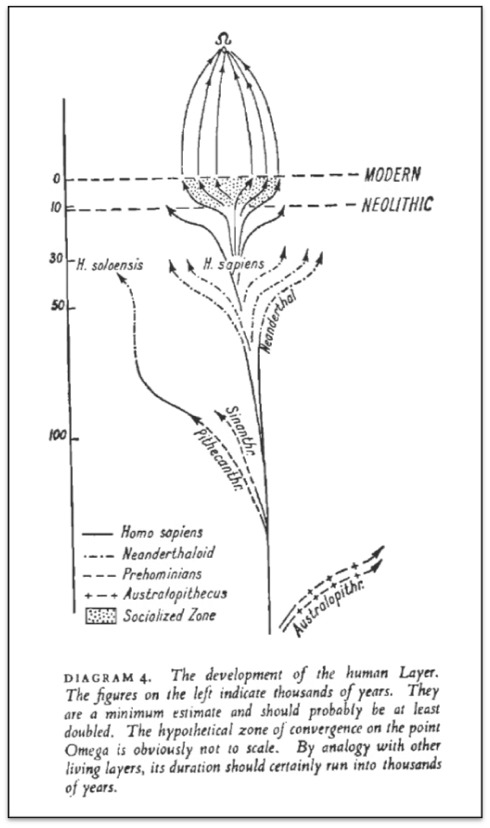
Pierre Teilhard de Chardin, The Phenomenon of Man, 1955
II. Misery Like a Coastal Shelf
Man hands on misery to man.
It deepens like a coastal shelf.
—Philip Larkin, “This Be The Verse”
What is it about the South that lends itself to the gothic? Ever since Edgar Allen Poe’s American reinvention of that European genre—of ancient curses, crumbling castles, monsters and murderers, of innocent women in distress and dark and stormy nights—Southern literature has often veered of into the uncanny and horrific as it’s modus operandi. And the answer as to why? Well, it’s not all the decaying castles scattered across the countryside. The answer is obvious: it’s slavery. The deep secret, the obscure past, the meaningless descent into gratuitous violence, the uncanny return of repressed trauma and desire: slavery.
Let’s take a tour of some maps… First, what do you think this one is?

If you answered “a map of which parts of America started socially distancing when during the pandemic,” then you are a winner. Here’s the key I excised from the original New York Times article the map appeared in (Ganz et al).
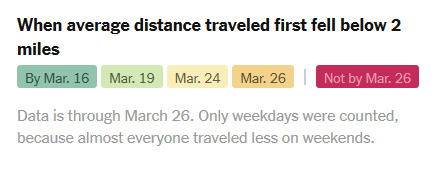
You’d be forgiven for mistaking this for a map of a lot of different things, but let’s cut to the chase. Here’s the second map:
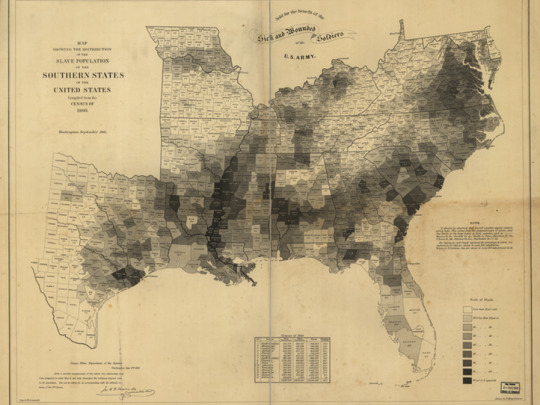
In case you’re having difficulty reading the title, let me help with this U.S. Coast Survey from 1861: “Map showing the distribution of the slave population of the southern states of the United States.” But just in case the point is not clear yet, here’s map number three:

That, everyone, is a map of the United States as it looked during the late Cretaceous period, many millions of years ago (126-65 mya, to be geologically precise; see Krulwich). That inland sea left rich alluvial deposits that became the fertile crescent of land known as, first geologically and then politically, the Black Belt. Needless to say, the agricultural quality of the land correlates strongly with the intensity of slavery practiced in the American South.
In Sigmund Freud’s Civilization and Its Discontents (a book we read often here in The Human Situation), the psychoanalyst uses the metaphor of the ruins of Rome to talk about the deep history of our own human minds. He wants us to understand how, even after they’ve been totally erased and are irretrievable, our earliest experiences shape who we are, just as the long-obliterated strata of Rome each successively dictated what was built after them. For me, when Larkin evoked misery deepening like a coastal shelf, Freud’s ruins of Rome and the cretaceous South sprang immediately to mind; I took it not as simile, but something that could be, often is, literally true.
This is what is meant in Faulkner’s famous epigraph about the past never being dead. Southern Gothic emerged as one of the most distinctive genres, blending mystery and murder and a deep sense of a looming violence in the world. Flannery O’Connor’s stories, as we have all seen, could easily be turned into horror movies, and William Faulkner’s work also includes many of the same themes. If we include Toni Morrison and Cormac McCarthy (e.g., the hauntings in Beloved or the demonic Judge of Blood Meridian), then the genre is easily the defining movement of twentieth century American literature. And it is not only slavery, but the history of violence that is the warp and weft of the institution, that colors our Southern Gothic. The Civil War is still the deadliest war in American history, and it’s not even close. Indeed, scholars have argued, often convincingly, that the region has to this day not recovered from the economic, social, and political devastation caused by the military conflict alone, not to mention its aftershocks, the devastation like a modern war fought 75-100 years before its time. “The past is never dead. It's not even past.”
III. The Injury of Intelligence, the Insult of an Education
A. Intelligence Is a Curse
As I’m sure you’ve noticed by now, O’Connor’s stories are chock full of characters for whom their intelligence is a curse. Hulga almost causes her mother an existential crisis because the pleasure- reading she leaves lying around is Heidegger’s “What Is Metaphysics?”; The Child is clearly the smartest one in the room; even The Misfit was marked off at a young age: “‘You know,’ Daddy said, ‘some that can live their whole life out without asking about it an it’s other has to know why it is, and this boy is one of the latters’” (129). So, too, Julian.
Julian is a writer who does not write. Like Hulga, whose philosophy is solely for herself, Julian’s fantasy world is solely for himself. And he seems to know that he is not a writer—he never expects to make a life/career/money out of it—which forces us to ask: why does he identify as a writer? But before we answer that question, let’s get right to the stakes. The clue is in the title, and O’Connor doesn’t make us wait too long. Immediately after she tells her son that he should be proud that his ancestors owned hundreds of slaves, Julian’s mother gets down to commentary on civil rights: “They should rise, yes, but on their own side of the fence” (408, emphasis added). So, rise: yes; converge: not so much for Julian’s mother. It is no mistake that this story takes place on a bus, the public space Rosa Parks made famous and which the Supreme Court desegregated in its 1956 ruling in Browder v. Gayle, five years before this story was published; the bus, for O’Connor, is again not a metaphor for race relations, it is the thing itself. Thus, unlike for Hulga, Julian’s fate and choices are going to extend far beyond himself—to the status of racism in America, the history of slavery, and reparations therefore—although they will extend to himself, too. Perhaps O’Connor is saying that the repercussions of the choices of the two, philosopher and writer, have different stakes. Perhaps.
Which brings us back to all these emotionally fraught intellectuals here, decaying slowly, like fish out of water, in their Southern hometowns. This theme is important for O’Connor because it argues intelligence, reason itself even, can serve not as something that enlightens, but something that closes off, distances, and deceives. The dark of reason. Like The Child in “A Temple of the Holy Ghost,” they can only see the difference in all things, and not the sameness; there are parts of everyday life that they have utterly rejected, and thus cannot connect to; they are alienated on their own soil, homeless in their own homes. And often with good reason! Julian’s mother is an out and out racist, and she represents the norm. He should reject her racism. But, for some reason, he cannot reject her herself. And he cannot reconcile the one to the other. I love her: she’s a racist; I must reject racism: I must reject her. His very love for his mother is a source of immense guilt for Julian, and that right there is the essence of the Southern Gothic.
There is a deeper lesson here, one that we don’t really have time for, about how Julian is actually trying to inhabit two different symbolic worlds, ones with different rules that justify themselves in different ways and that are ultimately incompatible. It’s like he speaks two different languages, but thinks they’re the same one and so often gets hopelessly confused. And the truth is something like that, when we recognize that culture is like a language that sets up rules for what and how we make meaning of the world. Heidegger famously said: “Language is the house of Being. In its home man dwells” (217). Hulga and Julian, justifiably reacting to the smallness and violence of the world they grew up in, have learned another world, but tragically cannot see their way back across the divide they have built; they’re emotionally attached, but intellectually distant, so they take refuge in that distance and decay psychologically, along with the old plantation mansion that Julian can’t help but dream about. Perhaps this is a problem O’Connor understood all too well. Her writing teacher in the Iowa MFA program had to ask her “to write down what she had just said” the first time they met her Georgia accent was so thick (vii, all emphasis mine).
B. A Martyr to the Desire of the Other; Or, that St. Sebastian Painting One More Time

When I worked in that highly suggestive, very famous painting of St. Sebastian into my lecture on Voltaire, I had totally forgotten that our erstwhile saint figured into our story for today, even though I had been reading O’Connor again over break. Sometimes the Unconscious, to paraphrase Larkin, fucks you up, but every now and again it does you a favor.
One of Julian’s fantasies is that he is a martyr to his mother. This should right away give us some pause. Take this for instance: “Everything that gave her pleasure was small and depressed him” (405). There is something deeply wrong with Julian’s relationship to his mother here; in fact, this is not a healthy relationship to have with any human being. Why on earth does Julian care what gives his mother pleasure? Shouldn’t he be happy that she is happy, despite it being over a ridiculous hat? Why would you ever arrange it so that, in the most important relationship in your entire world, anything that makes the other person happy makes you sad? That, my friends, is a recipe for disaster, death and disaster and tragedy. You don’t even have to read to the end. This is not going to end well.
To understand characters, you have to understand their motivations. This can be tricky. We can’t assume the characters are us, or anyone else but who they are. There are many possibilities for why Julian does what he does—alien mind control, for instance—but very few plausible ones. What, then, are Julian’s plausible alternatives here to his misery. Alternative one: leave his mother and move far away. He wants to be a writer? New York City, Paris, hell Houston or Atlanta: get thee hence. Anywhere but here (Hulga, too). Why, then, does he stay? We can be very, very cynical and say that Julian is broke and his mom’s supporting him. True! But not really enough. A lot of life can be lived in cheap apartments with ramen noodles, even on the commission of a typewriter salesman. This would be an excuse he would be telling himself, though we should also assume that many of the jobs he might be qualified for he would reject because they would conflict too heavily with his identity (as a writer), or just embarrass him (as being beneath him and his college education).
I think the real clue is in the saint imagery. But it’s not him who’s the saint, it’s his mother—a fair description for her achievements vis-à-vis Julian, which are not small, and which she is justly proud of. Even if taken literally, if he is suffering for his mother, as a saint, that means his mother is Jesus! His non-sacrifice of riding on a bus with his mother—“the time he would be sacrificed to her pleasure” (406)— is really her sacrifice. The problem is that, in this twisted relationship, his mother-the-saint is also a racist. Moreover, he knows that she’s not doing this for her pleasure: her doctor has told her she might die if she doesn’t become more active. Yet that’s how he frames it, which makes no sense … unless, here again, we should take this more literally than he means it: she’s staving off death, and as long as she is alive and enjoying life, then of course he cannot enjoy it. Ipso facto, he wants her to die, so he can move on. Again, her very existence is a source of guilt for him. Not because he hates her, but because he loves her.
C. The Terror of Identity; Or, Meeting Yourself Coming and Going
What does the phrase “you won’t meet yourself coming and going” (407) even mean? I had to pause at this phrase after O’Connor repeats it in the story, making sure to remember, as Professor Charara reminded us, that just because it is a cliché for the characters doesn’t mean that it is one for O’Connor. In short, it signifies a desire for uniqueness. If you do not meet yourself coming or going, you will not see someone else that looks like you on your journey.
This desire—to be singular, unique—is a pretty basic one. We all need some manner of distinguishing ourselves from others, otherwise the difference between self and other breaks down, and what it means to be uniquely our self does with it. This loss of self is, in almost all cases, terrifying for us. It is terrifying for Julian, because it is precisely what he fears in relation to his mother: he will never have his own desires, his own identity, but merely be an extension of hers, subsumed by his mother’s identity, her view of him. He will always be, as Professor Wallace discussed, an object and never a subject. (At the same time, to have nothing in common with other human beings is an opposite extreme, untenable as well. What it would even mean, to share no qualities with other people, no common bond over which you could unite, no language, aspirations, or anything else? Nothing.)
Of course, his mother does indeed meet herself going to the reducing class, in the form of a black woman with her child, angered about … something. Long story short, this woman hits Julian’s mother and storms off when she tries to give her child a penny. There is much to be wrung interpretively from whether or not it is this blow that causes his mother’s death, or Julian’s reaction to it. But I think this is a bit beside the point, much as the hat is. The truth of the situation is in Julian’s belated realization of his unacknowledged love for his mother—he calls out to her as a mother would to a child, or even a lover to their beloved, at the end, “Darling, sweetheart, wait!” (420)—and with that, his imminent “entry into the world of guilt and sorrow” (420). His coded wish for his mother’s death has been granted, but in so doing all the compromises he has made will no longer be tenable. He will, of course, blame himself for the way he acted vindictively toward her, even in her last moments, and he might even blame himself for her death.
Most of all, though, he will lose his ability to maintain that ironic distance that he has adopted toward the world, the one that has kept him locked into a fantasy world. There is compensation here: that fantasy allows him to live the life he secretly desires—not incidentally, the one where he can acknowledge his mother’s love and sacrifice, if not in word, then in deed. He does devote himself to his mother; despite what he says he is on that bus. The “in word” part is crucial here. Julian wants to be a writer because it allows him to keep an ironic distance toward the world as the detached observer who can catalogue all the worlds foibles while imagining that he is the hero setting them aright. But not in the real world, which is a bit too messy. When he imagines marrying a black woman, he tempers this fantasy by writing his fictional lover as not too black, her race only a suspicion (414). When he befriends black folk in his fantasies, it is only “the better types” (414). And when he imagines joining a sit-in, this is “possible but he did not linger with it” (414). Of course the possible is not something he lingers with! There is no ironic distance in the possible. Only jail, maybe even death. In fact, in a very real sense, Julian needs injustice to continue, because if it disappeared he would be forced to confront everything that he is fobbing off. Thus: “It gave him a certain satisfaction to see injustice in daily operation. It confirmed his view that with a few exceptions there was no one worth knowing within a radius of three hundred miles” (412).
I think a more interesting question than whether or not the child’s mother is responsible for Julian’s mother’s death is why she is angry to begin with. Julian is probably not wrong, that negotiating the casual violence of an antiblack society has shaped her outlook, and primed her for confrontation as an understandable survival strategy (compare her to the man who buries his nose in a newspaper, learning about the world at large while ignoring the world at hand). But perhaps we should look closer to home. If you were a mother negotiating public transit with your child, might you be annoyed if a grown man—a white man, in this very specific instance—forced you to split yourself off from your young child? And, assuming that she’s as good a reader of the world as Julian is, when you realize that he’s forced you into this situation because of some tiff he’s having with his mother? Julian delights in the fact that the children have been split from their mothers; he is himself keenly aware of the dynamic at play here. But because he is trapped in his own bubble—his own decaying mansion of the mind—he cannot see that maybe she does, too. And if Julian’s desire to separate himself from his own mother is achieved in this awkward social situation, it is imposed upon the mother and her child. Yet the stakes for each are different, and Julian knows this, too. He sees it coming from a mile away, but what he can’t see is that the cause is not his mother, but himself, and he cannot see it because then he would be the one thing he cannot be, his mother. He would see himself coming and going, in her.
Bibliography
Femia, Will. “Paleo-Politics: The Really Long View.” MSNBC, 24 Aug. 2012. Msnbc.com, http://www.msnbc.com/rachel-maddow-show/paleo-politics-the-really-long-view.
Glanz, James, et al. “Where America Didn’t Stay Home Even as the Virus Spread.” The New York Times, 2 Apr. 2020. NYTimes.com, https://www.nytimes.com/interactive/2020/04/02/us/coronavirus-social-distancing.html.
Heidegger, Martin. Basic Writings: From Being and Time (1927) to The Task of Thinking (1964). Rev. and Expanded ed, San Francisco: Harper, 1993.
Helms, Douglas. “Soil and Southern History.” Agricultural History, vol. 74, no. 4, Agricultural History Society, 2000, pp. 723–58. JSTOR.
Krulwich, Robert. “Obama’s Secret Weapon In The South: Small, Dead, But Still Kickin’.” Krulwich Wonders. NPR.Org. 10 Oct 2012. https://www.npr.org/sections/krulwich/2012/10/02/162163801/obama-s-secret-weapon-in-the-south-small-dead-but-still-kickin. Accessed 14 Apr. 2020.
Mullen, Lincoln. “These Maps Reveal How Slavery Expanded Across the United States.” Smithsonian Magazine. www.smithsonianmag.com,
Faulkner, William. Novels, 1942-1954. New York: Library of America, 1994.
O’Connor, Flannery. The Complete Stories of Flannery O’Connor. Farrar, Straus, and Giroux, 1972.
Reni, Guido. Saint Sebastian. Circa 1615. Musei di Strada Nuova, Wikimedia Commons, https://commons.wikimedia.org/wiki/File:Guido_Reni_-_Saint_Sebastian_-_Google_Art_Project_(27740148).jpg.
Sexton, Richard. Oak Avenue, Wormsloe Plantation. 2009, https://richardsextonstudio.com/wp-content/uploads/2015/06/19-c070.jpg.
Teilhard de Chardin, Pierre. Building the Earth. Wilkes-Barre, Pa. : Dimension Books, 1965. Internet Archive, http://archive.org/details/buildingearth0000teil_y0u0.
——. The Future of Man. New York: Doubleday, 2004.
——. The Phenomenon of Man. New York: Harper Perennial, 1955.
2 notes
·
View notes
Text
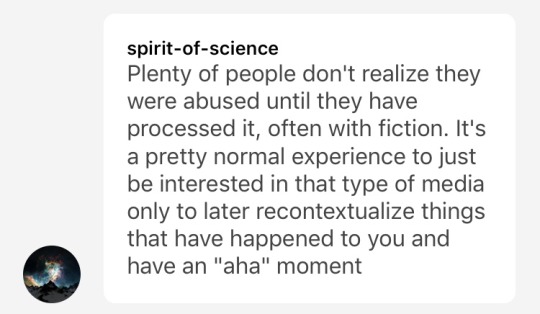
@spirit-of-science
I hope you don’t mind me capping this (and if you want me to I can delete) but it was on a post that I really didn’t want to derail and I’d like to chime in with my own two cents because this is the goddamn truth.
A bit of preface: I was (for all intents and purposes) groomed then eventually raped by my stepfather from around the time I was 11 until I was 18. For a really, really long time I was convinced that it was consensual and thus nothing was wrong with the arrangement because I technically approached him first by asking questions about sex. I asked him to kiss me and I also asked him to touch me. Whether or not this was the result of some deeply, deeply repressed trauma when I was even younger than that is really hard to say because I honestly don’t remember anything happening before this stuff with my stepdad - but to be fair my childhood memories are choppy at best and just plain nonexistent at worse so it is possible. Anyway, I never applied “CSA victim/survivor” or “rape survivor” or any sort of “victim” label to myself because, and I still feel this way to a certain extant, I actually DID ask for it. No amount of woke posts on tumblr or even PSA’s in school were enough to convince me that something was wrong here.
I’d also like to point out that all this happened before we even had a computer in the house, let alone did I have any kind of unsupervised net access, and my stepdad couldn’t have been any further away from fandom spaces. He actually lacked any real interest in genuine hobbies to the point where it’s now deeply worrisome to me in retrospect.
The thing that stands out to me the most, which of course I didn’t even think anything of at the time, was a day he came home when my mom was still at work and he said he’d “borrowed a porno from a guy he worked with” and asked if I wanted to watch it. He stood over me the whole time it was playing, just over my shoulder, arms crossed and dead silent. I remember being anxious and nervous and embarrassed, but I chalked it up to excited jitters. It just seemed so innocuous to me that I never actually stopped to consider how wrong that whole situation was or how strange it is for a 30 something year old man to come to me like that.
So long story short I went through my entire adolescence believing that this was normal and fine without realizing the affect it was having on me and my relationship with my peers. I went through my early 20’s thinking “I asked for it, so he didn’t do anything wrong”. It was not until literally last year, at the age of 28, did I suddenly have the epiphany that ... I was raped by a pedophile.
What was the catalyst you ask?
An incest fanfic.
Or rather, a full blown series of fanfics that have the incest thread connecting them and a fucked up family together in perfect disharmony.
I’m not gonna post a link or anything, as I believe the author was venting their own traumas through these works, but basically it detailed the whole sordid affair from the grooming, to the rape, to the abuse and to the long reaching aftermath effects and how it can manifest itself in extremely unhealthy ways. It was an emotionally draining read but I literally could not stop.
And the real kicker here? It was never presented as being bad. The author never said “please note that I don’t condone this in real life”. In fact it was porn, through and through, written with the explicit intent of arousing the reader in the most fucked up ways possible.
I started off reading it because I was desperate for ANY content of a specific character, who just so happened to be the main perpetrator of abuse in these fics, and I never once applied myself to the situation. I thought I was different. That this didn’t apply to me. That I wasn’t abused or raped, and this is the best written porn for my favorite character so I’ll take what I can get. Doesn’t matter that it’s incest, I can self insert into anything.
Then I got to the chapter where the son, the main victim of abuse, had an encounter with his teacher who explained in detail that no matter what the boy thought he wanted, asked or begged for, it was NEVER okay for an adult to engage with a minor sexually. That adults know better, or should know better, and that it was rape whether the boy wanted to believe it or not. That he was a victim. That he wasn’t mentally or physically capable of making an informed decision regardless of how he might think differently.
When I say this shook me to my core, I’m not exaggerating. Never in my life have I looked at the situation from that angle, that mindset. Suddenly everything was clicking into place and I spiraled hard for a few good months. I was suddenly looking at everything that had happened to me in a different light and for the first time ever I acknowledged that, yes, I was a victim. That what he did was wrong, whether or not Id asked him to do it or not. He should’ve known better. He shouldn’t have taken my innocent away like that. I deserved better. And with that new outlook on things, I’m realizing how deeply and how negatively the entire thing fucked with me.
Depression, anxiety, terribly low self esteem, poor decision making habits, no real clue how regular relationships work or even HOW to initiate them. I see myself as nothing but a sex object, good for nothing else and desiring nothing else, because that’s all I was treated as from preadolescence straight through to adulthood. Like, shits fucked up and I’m honestly glad I read that incest fic because I would have never been able to acknowledge any of this without that specific discussion between those two characters because it wasn’t actually directed at me, nor was I a part of the conversation. Being removed from the situation as the reader was what made the lightbulb go off for me.
All that being said I’m a big proponent for letting people ship whatever they want. I’m not triggered by any sort of problematic content, not even now, and I still reread those fics from time to time because they’re honestly just that good but they also help me wade through my past a little bit more each time. I don’t see anything wrong with age gap ships, adult/minor ships or even lolicon/shotacon. I certainly don’t begrudge anyone who doesn’t like those things, as I understand it’s upsetting, but from MY perspective as a victim fiction can never, ever compare to the horror and moral bankruptcy of the real deal.
Honestly? I wish my stepdad had busied himself with jerking it to lolicon doujins instead of taking advantage of me. If I have to choose between real victims and fictional victims, I know which side I’d take. The reality is just so, so much more worse than anything a fic writer or a hentai artist can ever produce.
And I think it’s worth noting at this point that my stepdad was a victim himself. He didn’t watch some piece of media featuring incest or rape or pedophilia and decided to give it a shot. I literally don’t think I can stress enough how much it doesn’t work like that. No amount of media can make someone do these things. He was raped when he was a child and the cycle of abuse merely continued. There was no outside push from problematic fiction. There was no normalization making him think it was okay. He KNEW it wasn’t okay, that’s why he let me come to him and never forced himself on me. This sort of stuff is insidious, rest assured, but the only people who are going to use fiction to groom a child are the people who were going to rape a child anyway, regardless of what tool they use to achieve that goal. Antis are fighting the wrong fight and if they actually cared about victims (like me) they’d focus their efforts on the real world and the living breathing humans who are suffering right this moment but they won’t. They just fucking won’t.
2 notes
·
View notes
Photo

Meg Baird Interview — 2007
Sunday interview! This one was conducted way back when via email. Dear Companion is still great! In fact, most everything Meg Baird does is great -- have you checked out the Heron Oblivion live LP?! Wow. I also hear rumors of an upcoming collab LP with harpist extraordinaire Mary Lattimore.
With her lovely-from-start-to-finish solo debut Dear Companion (Drag City), Meg Baird takes a break from her duties in the Philadelphia psych-folk collective Espers. The apple doesn't fall far from the tree, though. The ten songs here are deeply rooted in traditional song forms (from age-old British Isles ballads to Appalachian laments), as well as the 60s and 70s singer-songwriter era (from Jimmy Webb to New Riders of the Purple Sage). With a few of Baird's own originals mixed in, Dear Companion stands as one of the best all-acoustic records since Gillian Welch's Time (The Revelator). Mostly comprised of Baird's high, pure vocals and intricately picked guitar, the album conjures up the timeless and universal nature of the best folk music. We chatted with Meg about her inspirations, obscure Canadian folksingers and Bob Dylan's amphetamine-fueled ramblings.
Whether it's performed by the Everly Brothers, Bob Dylan, Norma Waterson, Michael Hurley or by you on Dear Companion, "The Cruelty of Barbary Allen" is one of those songs that always stops me in my tracks. What do you think it is about this 500+-year-old song that gives it such a powerful resonance even today? How did you come to record it for the album?
My version came from an amalgamation of Michael Hurley's version from Sweetkorn and another from a Jean Ritchie recording with a totally different melody — these are my two favorites. I learned this one just for Michael actually. About three years ago, he agreed to try and record a few songs for a few days with Espers during a stop on his spring east coast tour — just to see what happened. This was one of his top recommendations to try so of course I learned it just in case.
Perhaps the resonance of this song is a little bit cumulative? For a contemporary listener, if you've made a decision to actually forgo your healthy cynicism for all the maudlin associations genuinely attached to this sort of material, then you are listening with a pretty well primed imagination. The main storyline here is so straight — two young ones eventually killing themselves over a misunderstanding in a lover's quarrel. But the way each scene unfolds gives us all the vantage point to protest "No, don't do it, it should all work out!" just like we would in any horror film or melodrama. It's a very unifying populist pastime to hope that it will all work out, when we know that it won't. This experience can so easily become twisted into pure manipulation, but here it can feel wonderful — like a chance to just experience a feeling in a spectrum of feelings. The colors in this world seem so vibrant, the perception of history so vibrant. You've made these scenes all yourself, and they seem safe from being diminished by the elements.
Listening to Dear Companion (not to mention your work with Espers) I'm reminded of this old quote from Dylan: "What folk music is... is based on myths and the Bible and plague and famine and all kinds of things like that which are nothing but mystery and you can see it in all the songs … All these songs about roses growing out of people's brains and lovers who are really geese and swans that turn into angels … and seven years of this and eight years of that and it's all really something that nobody can touch ... (the songs) are not going to die." What do you think – is this an accurate summing up of the so-called folk tradition, or was Bob just blazing on amphetamines when he said that?
Probably your last theory about amphetamines is true, but aside from that, this is a pretty adept description of mystery in folk song. Although it is a really amped up, exceptionally urgent description, it also seems in keeping with a tone used very commonly at that time. His urgency especially makes sense with the last line, about how "(the songs) are not going to die." Maybe I agree with this very believably passionate depiction of being moved by this music, but perhaps I don't get to share in his blazing confidence in its immortality.
What/who was the album/song/artist that really turned you on to folk music? What made you think: "I want to do something like this."
I'm sure it is a really long, ongoing series of events, but one flash moment like the one you describe, particularly in relation to straight traditional music, happened when I was 19 (reasonably well-versed in the college radio canon of the time) and my sister Laura took me to a Sheila Kay Adams performance. I certainly did not ever think that I could do anything quite like that, but it literally opened up a world of possibilities of what music and performance can do, in addition to helping me see ways around some of the obstacles that can come up around identity hang-ups concerning audience, format and other limitations sometimes imposed by self-flattery. I got a chance to meet her a few years ago and tried to thank her and tell her about this experience I'd had, but all I did was burst into tears like a crazy person. Hopefully she understood something good in my maligned attempt to communicate my extreme appreciation.
The spare, uncluttered sound of Dear Companion really makes it stand out from much of the music being released today. Was making such an austere record your intention going into the recording process? Do you imagine that your subsequent recordings will continue in this vein, or do you have string sections and trumpets and backup singers in your future?
Sparsity and warmth were definitely guiding intensions. I used overdubs to add some imagination to the record and save it from being too literal. By the final mix, I thought it would be fun to think of vocal and guitar overdubs as my only allowed effects or "tricks" For this reason, I got a great kick out of selecting only one brief moment of Space Echo-drenched electric. With the rest of the record being so spare, it was a really enjoyable method to try and emphasize this effect to its maximum.
I don't know yet how I'll record the songs I'm writing for the next record. I'm sure that I will want to try something new, but seeing now just how clearly I totally over-thought the sparsity issue, I guess that new approach could really take any shape.
I'm familiar with a few of the artists whose songs you cover here – Jimmy Webb, New Riders of the Purple Sage – but Fraser & Debolt are completely new to me. What can you tell me about them and this fantastic song you've included, "The Waltze of the Tennis Players"?
I know very little about Daisy Debolt, Allan Fraser or Ian Guenther much other than that they are Canadian and they made this completely amazing record together that a good deal of people seem to truly love. (I think that the "hit" was their knockout version of "Don't Let Me Down") "Waltze" in particular must be one of the most imaginative songs on the subject of courtship that I have ever heard. The whole record is incredibly tender, raw and earthy; seemingly fueled by the same kind of human will and warmth that keeps a person alive through the winter. Despite how outwardly folky this record is, it has always reminds me a great deal of Dead Moon. A really nice, in-depth fan Web site is maintained for Fraser & Debolt.
Tell me a bit about the recording process for Dear Companion. What did your Espers band mate Greg Weeks bring to the proceedings? Were there songs that you attempted but that didn't make the final cut?
I recorded this album on a few long, spare afternoons during the recording of [Espers'] II. My plan was to prepare madly for the taping sessions and get everything on tape in very early takes. I had been playing some of these songs for years, some only for a month, but all of them required a great deal of rehearsal for these sessions.
Greg brought his incredibly adept engineering ears, great gear sensibility and some really gutsy approaches to the recording levels that wound up having a pretty interesting effect over the whole record itself. It was also great to have someone so talented to bounce tracking ideas off of and to double check on my performance quality. We work together all the time, so of course Greg was able to really help me keep to this goal of recording these songs very quickly and comfortably with little fuss or ramp up time.
I dropped the bridge from "Waltze" because the original creates a level of blasting off that I truly couldn't pull off to any good effect. Among other missed selections, my version of Peter Hammill's "(On Tuesdays She Used to Do) Yoga" will just have to remain mine for private enjoyment.
Now that the album is soon to be out in stores, what are your plans? Are you going to play any solo shows? What's next for Meg Baird!?
I have lots of plans, unfortunately none of them so well formulated to tell you anything specific. I have a very busy imagination, perhaps too busy, and Espers is quite busy at the moment as well. Despite all of this, I definitely am trying to arrange some public performances timed near the release in late May.
7 notes
·
View notes
Text
Cody’s Top 10 of 2017
By Cody Lunsford
In 2016, I did a very bad job of watching movies. I only saw FOUR of the movies nominated for best picture. 2017 was VERY different. I’ve seen every movie nominated for best picture. I saw a grand total of 107 movies released in 2017, plus all of the older movies that I watched this year.
There were a lot of factors that came together to create this surge in movie watching. (1). I got MoviePass. Chad’s written about how valuable of a service it is and it’s absolutely true. I’m able to see so much more in theatres now because I’m not breaking the bank to do so. It also makes me feel less bad about seeing movies that seem like they’re obviously bad. (2). I got Netflix DVD. “What is this: 2006?!” I hear you saying. But it’s actually been a great service. Obviously there’s lots of stuff that’s on streaming services, but there’s also quite a bit that isn’t which is why it’s great to get the DVDs (as a supplement to streaming of course. Still got have that Netflix/Hulu/Amazon/HBO Go cocktail). Netflix DVD tends to get newer movies before streaming services, in addition to having some older, harder-to-find stuff. (3). I got more active on Letterboxd. It is, without a doubt, my favorite social media platform. For those of you who don’t know, it’s a way to log movies as you watch them and share your thoughts on the movies, see what your friends are watching and their thoughts on movies, and make lists, which made making this top 10 list an easy task since I’ve been working on it all year. (4). I started a movie podcast with my friends. It’s called Best Pictures and our goal is to find the best movie for every year we’ve been alive. Yes, this is a plug, but it’s also definitely a reason why I watched a ton of movies this year. I had to keep up with my co-hosts and sound like I knew what I was talking about.
That’s why I watched so many, but now let’s get into what movies topped the list. It may seem weird that a “best of the previous year” list isn’t coming out until mid-February, but I wanted to make sure that I had seen everything that might would make my list. Let’s begin with some honorable mentions.
HONORABLE MENTIONS (#35 - #11)
#35. Darkest Hour, #34. Molly’s Game, #33. It Comes at Night, #32. Logan Lucky, #31. Okja, #30. War for the Planet of the Apes, #29. Baby Driver, #28. American Made, #27. Thor: Ragnorak, #26. Good Time, #25. Spider-Man: Homecoming, #24. Ingrid Goes West, #23. Annabelle: Creation, #22. Coco, #21. Detroit, #20. Alien: Covenant, #19. Blade Runner 2049. #18. Mudbound, #17. Brigsby Bear, #16. I, Tonya, #15. Star Wars: The Last Jedi, #14. The Meyerowitz Stories (New and Selected), #13. Phantom Thread, #12. Your Name, #11. The Florida Project.
Look. 2017 ruled, film wise. It’s hard to narrow down stuff that I really liked. Now to top #10.
#10. Super Dark Times

Super Dark Times was a bit of a surprise for me. I watched it when it came on Netflix and was instantly blown away, realizing that I may be watching a new cult classic in the making a la Donnie Darko. It’s tense and horrifying and completely grabs your attention from the very opening of the film. It’s the type of movie that make your eyes grow wider and wider with each passing scene. The only thing that I’m unsure about when it comes to Super Dark Times is it’s ending, though that also adds to its likelihood to attain cult status, as it’s the type of ending that can debated and discussed for hours.
#9. Raw

Raw isn’t easy to watch. It’s about a vet student who develops a taste for human flesh. With a premise like that, it’s obviously going to lead to some gnarly scenes. But the beauty of Raw lies in how much the film elevates what could be a schlocky b-horror movie premise. Raw isn’t just about cannibalism, it’s also about finding yourself at college. It’s also about how your family still has a giant influence on you even when you leave them. It’s also at times about the special bond that siblings have. And yes, it’s also about eating people.
#8. Logan

The best superhero film of the year and arguably one of the best ever made. It’s brutal and rough, yet contains one of the strongest emotional threads I’ve seen in superhero movie. Hugh Jackman gives a performance as Logan that is completely unique to this film, yet doesn’t feel disingenuous to the iterations of Wolverine that we’ve seen before. Dafne Keen is a revelation as X-23, portraying just how tough a kid has to be in this grimy future. It’s incredible that despite me not being the biggest fan of the X-Men franchise as a whole, especially the last few, that this movie can still swoop in and hit me like a ton of bricks. There’s not many superhero movies I’ve cried during. This is one of them.
#7. The Post

It’s hard to imagine a world in which this movie would be bad. With the all-star team up of Steven Spielberg, Meryl Streep, and Tom Hanks (and that’s not even counting the insane roster of supporting actors), there was no doubt in my mind that this would be excellent. It’s the type of movie that makes you want to stand up and cheer at people who persist until they win. It has incredible scenes that make your heart race, such as when Bob Odenkirk goes to get the Pentagon Papers and the later scene when Tom Hanks’s team sorts through the documents. It also has little Spielberg touches, such as a little girl making a killing selling lemonade to the team, that tie the whole thing together and make it feel human.
#6. The Big Sick

I’ve known who Kumail Nanjiani and Emily V. Gordon are for many years from following the LA comedy scene so it has filled me with absolute joy to see a film that they wrote, based on their real life experiences, be such a hit this year and get Oscar attention in addition to being well-liked. It’s a rom-com that defies some standard rom-com tropes and offers a unique love story that we’ve never before seen on film. The movie also does right by Emily’s parents, played by Holly Hunter and Ray Romano doing some of their best work. Instead of making them obstacles in the way of the romance, it fleshes out these characters and Kumail’s relationship with them. It’s such a brilliant twist on the rom-com formula to have Emily’s parents be on board with Kumail before Emily herself is.
#5. Dunkirk

Finally, some recognition for Christopher Nolan (though before this, the last movie of his that I loved completely was The Dark Knight.) This is a war movie that is done in a way I’ve never seen a war movie been done before. It features Nolan’s trademark fascination with messing around with timelines, intercutting between storylines that take place over a week, a day, and a hour respectively, before finally culminating together. It’s tense and fast-paced. You barely get to know any of the characters’ names, which actually works to drive the idea that Nolan is presenting home. This could be anyone’s story of war, it doesn’t matter the specifics.
#4. It

Stephen King is probably my favorite author. I’m a huge fan of things that are spooky and I’ve always loved that in his stories, he’s able to make you care deeply about the characters as well as scare the hell out of you. It’s been awhile since we’ve had a mind blowingly good film adaptation of a Stephen King movie and It definitely reached that status. Bill Skarsgard as Pennywise the Clown is unsettling, yet still somewhat funny. The scares are unique and terrifying. The kids are so damn good. It’s a mammoth book and the way that this adaptation streamlined or cut things out was masterful. I feel like this may be one of the movies on this list that I revisit the most.
#3. Get Out

I’m sure you’ve gotten the idea already that I’m a big fan of horror films. And while It showed what the big blockbuster version of a horror movie could be (and let’s still be clear, the blockbuster version of a horror movie still has a much smaller budget than other blockbusters), Get Out offers how effective a small budget horror movie could be. It also came in and demanded that horror being taken seriously, becoming the first horror film to be nominated for Best Picture since The Silence of the Lambs, though there’s definitely an argument to be made that particular film is more of a thriller. That would make Get Out even more impressive, making it the only horror movie nominated since The Exorcist. Regardless of how you define other movies or how long it’s been, there’s no arguing that Get Out is impressive, especially considering it’s Jordan Peele’s directorial debut. I’m fascinated to see where he goes next.
#2. Lady Bird
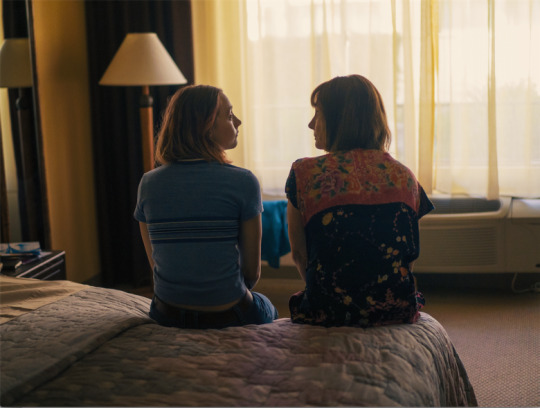
It would’ve been hard for me to hate this movie. It’s funny, it’s coming of age, it’s got scenes of musical theatre. Every character in this film is completely realized and painfully authentic. Every funny moment in the film feels real. The relationships that Lady Bird has, with her mother, with her first loves, with her best friend, with her dad, with her brother, are completely relatable and speak to that unsureness, yet complete brazen confidence that comes with being a senior in high school. The throughline of being ashamed of where you came from, yet proud once you’ve left is especially poignant as someone who left a small town to go to college. The realization that your parents are just people and that despite you feeling frustrated and suffocated, they want the best for you, is a hard thing to grapple with and this movie handles it beautifully.
#1. The Shape of Water

“HAHA, that’s that movie where a girl bangs a fish, right?” I mean...yes. But the beauty of The Shape of Water to me is that particular moment doesn’t really even feel that weird. The film instantly immerses you in a storybook world set within a version of the 1960s that isn’t quite true to life. It’s a fairy tale, through and through, complete with a musical daydream, a frog prince, a princess who’s been struck by some “curse”, and a villain who is literally rotten. There’s a lot of arguments that this movie is a bit simplistic or things move at an accelerated rate and to that I say: it’s a storybook. It’s not real. It is meant to feel fantastical and not grounded. It looks gorgeous, performances are phenomenal, and you feel the love put into this production in every scene. I love it.
For more on my thoughts about these, and other movies, listen to the latest episode of Best Pictures where we have the FIRST ANNUAL PICKIES to nominate OUR best of the year.
#blog#top10movies#top 10 of 2017#movies#film#super dark times#raw#the post#shape of water#lady bird#get out#it#dunkirk#logan#the big sick#movie ranking#best of 2017
3 notes
·
View notes
Text
The Haunting of Hill House (2018)
I remember sitting through the first episode of this series with my mom, thinking that it wasn't the best option for us to commit to, worrying that it would be a waste of our precious mother-daughter bonding time. The pacing of the first/second episode was too.. American, the emotional expressions too unsubtle, leaving little room for my audience participation, the acting too stilted, and the actors behaving too much like stage thespians .. and because I'd chosen the series after seeing rave reviews online, I remember sitting through the first episode thinking, huh, this is the shit people been losing their minds over?
And then.... suddenly, quickly, it became one of the most deeply affecting and disturbing shows I'd experienced, and thus eventually, one of my favourites. I'm deciding to write this now, about 9 months after I finished the series, because I've just started on The Haunting of Bly Manor, which is described as a "follow-up" series to Hill House. The narratives are not connected, but much of the cast and crew are the same, which is nice because I was so so so so so impressed with the acting of these specific returning actors in Hill House, and after reading a little more into the production process, I've been allowed to understand that the crew is fucking epic and genius as fuck too. I love this series!!!!!
The title of a Youtube video that I love a great deal on this series, by one of my absolute favourite film analysis video essayists, Ladyknightthebrave, is: Stretching Genre - A Haunting of Hill House Video Essay. And maybe this is what I'll talk about first - genre. I've never particularly cared for 'horror' because I'd rather be able to engage with themes and tropes I can relate to in my own life, stories that resemble my own world from my own ever-romantic perspectives. I've always wanted to delve into horror, to appreciate the elaborately designed surfaces as well as be affected in whatever ways by any depth of conversation or concept, but I don't think I've ever been able to achieve any of this. I've tried to enjoy both superficially (i.e. entertainment value) and also more real-ly many horror productions, but always left with a deep sense of meh. Crimson Peak (which I reviewed here back in 2016) might be the closest I've come to engaging genuinely with anything from this broad genre, but even then I think I liked it more for its kitsch value, its beautiful beautiful beautiful soundtrack, than for the genre-specific parts of the narrative. But I mean, everything makes a film right? The soundtrack and the costumes and the acting are the horror elements in themselves too, I know.
Even then, a lot of the simple reactions I've read for Hill House are ones of surprise, where audiences went in not realizing that a series with the words The Haunting of.. in its title would leave them feeling utterly heartbroken, distraught (sad), emotionally-invested as it were any other drama series. In that Ladyknightthebrave video I mentioned, at multiple points in her essay she says, simply, "hey,... I'm sad" when referencing a particular scene or conversation. And that was, too, my overwhelming reaction to the whole series.... I'm sad!!!!!
Perhaps I should describe the plot a little first.. so the Cranes are a family of 7, mother and father and 5 lovely children: in descending order of age, they are Steve, Shirley, Theo, and twins Luke and Eleanor (Nelly). Here is the official synopsis:
This modern reimagining of the Shirley Jackson novel follows siblings who, as children, grew up in what would go on to become the most famous haunted house in the country.. Now adults, they are forced back together in the face of tragedy and must finally confront the ghosts of their past. Some of those ghosts still lurk in their minds, while others may actually be stalking the shadows of Hill House.
And, from wikipedia, here are some of the notable reviews of the series:
Corrine Corrodus of The Telegraph graded the series with a 5/5 rating, calling it "the most complex and complete horror series of its time." Brian Tallerico of RogerEbert.com gave unanimous praise to the Netflix adaptation, describing it as "essential viewing," and stated that "[the show] contains some of the most unforgettable horror imagery in film or television in years." David Griffin of IGN gave the series a rating of 9.5 out of 10, calling it "a superb and terrifying family drama," and Paul Tassi of Forbes described it as "absolutely fantastic" and stated that "it may actually be Netflix's best original show ever."
Horror author Stephen King, who holds considerable admiration for Jackson's novel, tweeted about the series, "I don't usually care for this kind of revisionism, but this is great. Close to a work of genius, really. I think Shirley Jackson would approve, but who knows for sure."
Filmmaker Quentin Tarantino, in interview with The Jerusalem Post said, "My favorite Netflix series, with no competition, is The Haunting of Hill House."
Due to obvious reasons I give zero fucks about what either King or Tarantino might have to say about, uhh, anything on this planet, but YASSSS RETWEET everything above!!! It is essential viewing!!! Indeed the most complex and complete series of its time!!! Unforgettable imagery!!!
Okie so now on to my own original thots...
My main learning was this: Horror, i.e. the presence of something horrific, for it's characters in the show/story, isn't about feeling frightened or them 'losing their minds' or being driven to questioning their own perceptions of reality or anything like what we've seen in the last 7 decades or so of seeing the genre develop and evolve. In Mike Flanagan's beautiful ode to Shirley Jackson's incredible story, we come to understand that horror is only ever about genuine trauma. I guess, like I talked about earlier, I never really understood what horror's raison d'etre was at all.. like... why?? What is the greater, lasting impact of having audiences shaking in their boots? What is intended by eliciting a gasp or a scream? WHAT IS THE MEANING OF ALL THIS?!
I asked, and I've been asking and asking for years, and finally Hill House provided: Horror is, in fact, about unspeakable pain.. Pain that has no outlet in a world that will only ever be skeptical of such experiences... it's about being genuinely haunted in such a way that you can never dream of stability in your life ever again; it's about developing into a closed-off, maladjusted adult, knowing that your experiences of early life cannot be related to anyone else's in any way, not even that of your siblings. I remember taking away this lesson very early on in the series, possibly midway through the second episode. Because the siblings (Steve, Shirley, Theo, Luke, Nelly) are all utterly flawed and thus 'real' characters, we're able to quickly why they are the ways they are. (Important note: the siblings are not flawed in ways that make them unlikable at all, or unrelatable, or downright unpleasant to watch - this is a flaw that other productions have definitely fallen prey to before in the name of achieving that 'realness' however Hill House judges things so perfectly that we are endeared to their flaws and never put off by them.) Their disparate experiences with Hill House growing up, their subsequent very personal meaning-making journeys (some looking more like denial, some resulting in substance dependency), their different levels of having access to the 'truths' about what went on in that cursed home, all of this meant that the siblings ended up, where we see them in 'current day', being broken adults with a lot of misplaced anger, unprocessed trauma, and resentment toward one another. It is the aloneness in all their experiences that is the true horror, and the horrors were a very personal, existential kind and so there was no room for mutual bonding and sharing until it was too late, until their babiest of baby sisters had lost herself to the pressures calling her ‘home’.
And suddenly, I realised: this is the true evil. Ghosts don't ruin lives by doing a good epic scare here and there or by turning your irises white by revealing some fucking scary shit: ghosts are seriously... so... fucking... evil because they ruin your whole entire lives..!!! Horrifying realities take the form of many different things, even if they all originate from one main source. The Crane siblings, as children, had to deal at once with their mother being predisposed to falling victim to the spirits of the house due to, as hinted, mental health conditions of her own, while also dealing with differently confusing aspects of a house and a home that taunted them by making them feel unsafe and secure all at once. Now I say all this from an.. artistic appreciation pov, because I am myself unconvinced that the 'supernatural' or anything of a spiritual realm influences our daily lives. Which is all the more significant, right? That a ""skeptic"" like myself (although I'm not an insensitive and stubborn over-rationalizing dumb male like Steve is in the show) could suddenly realise the tragic effects on many many vulnerable souls of a world that clutching on to its medical models and objective scientific truths.
From the series' wiki page: The Haunting of Hill House received critical acclaim, particularly for its acting, directing, and production values, with many calling it an "effective ghost story."
So yea... finally I know what that means. Finally I know what effect a ghost story can and should have. Finally I understand the potential of the genre!!! Sigh there is literally SO much I could say about how and why this is the best series in the world but maybe I'll stop here for now..? There would be no end if I were to discuss everything because it's one of those series that has 'easter eggs', in the form of hidden ghosts (visual) lurking in the dark or specific lines that foreshadow something else later on, but I've never really cared much to 'reveal' these things so yea, go forth and enjoy this best show everrrrr :-)
(For example there is a lot of discussion online about how each of the 5 siblings represent the 5 different stages of grief à la Kübler-Ross, with the eldest Steve being in complete denial that there was ever any supernatural presence to explain their experience, Shirley reacting with sheer anger to all around her, Theo bargaining her way through her own internal conflicts, Luke being surrounded by swirling depression fueling his drug dependency, and Nell eventually accepting the so-called inevitable, etc etc etc but this kinda analysis is a little too lowbrow and heavy-handed for me to get into so yea haha)
There is a specific dialogue that I want to reference however on my way out: when Nell's suicide/death is revealed early in the series, Shirley has the difficult talk with her young children about it. And these 2 simple lines umm basically summarize the entire plot:
Shirley's son: Why did she die? Shirley: I don't know.. I'm just so sad that she did
Everyone watching the show would relate to that immediately but also that sentiment rings more and more and more true as the episodes come to reveal what a painfully innocent and giving soul Nell was... :(
So sad !!!!!
----------
Edit: copying below my mom’s initial thoughts after I forced her to read this post hehe, because her words describe a lot of what I think and feel too, and because I want to remember our discussion and reflection forever!
Each of us - lives scarred at some time – in some private way – religion drowns it, cosmetises – but horror – is the Couch of reflection, reliving and something of a letting it out. Feeling again the horror/fear/anxiety/pain/aloneness of that real trauma – but in an shared room, even if only shared with an older, saner, wiser, learning you.
0 notes